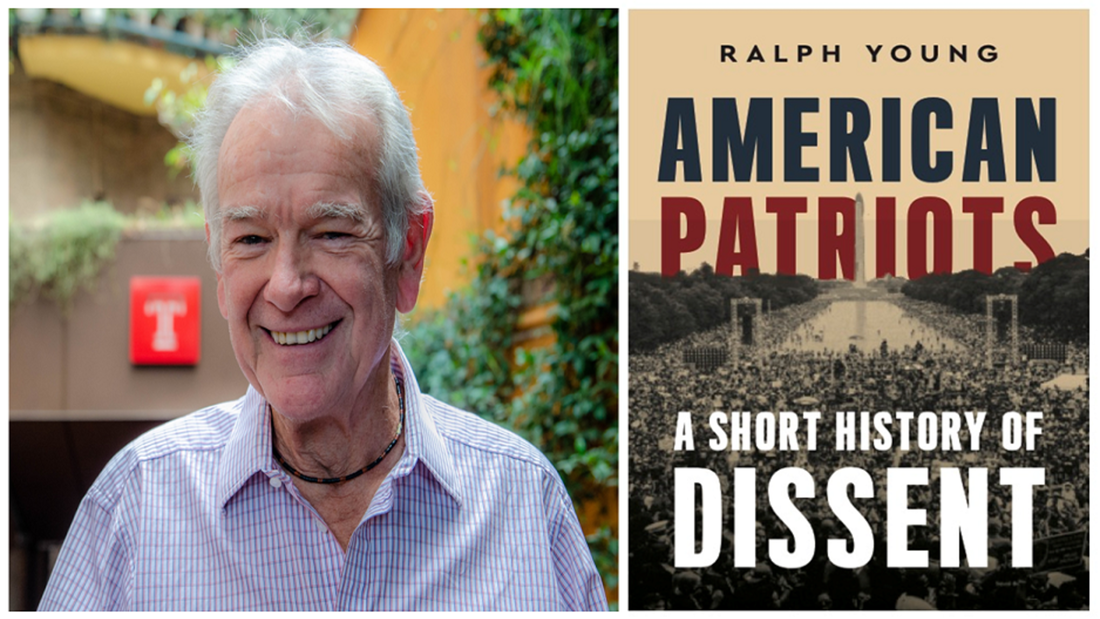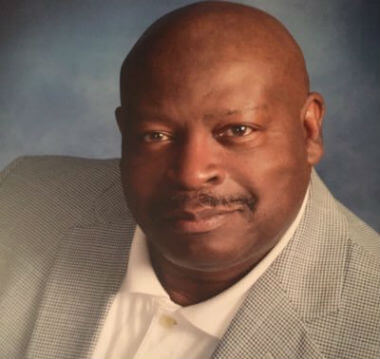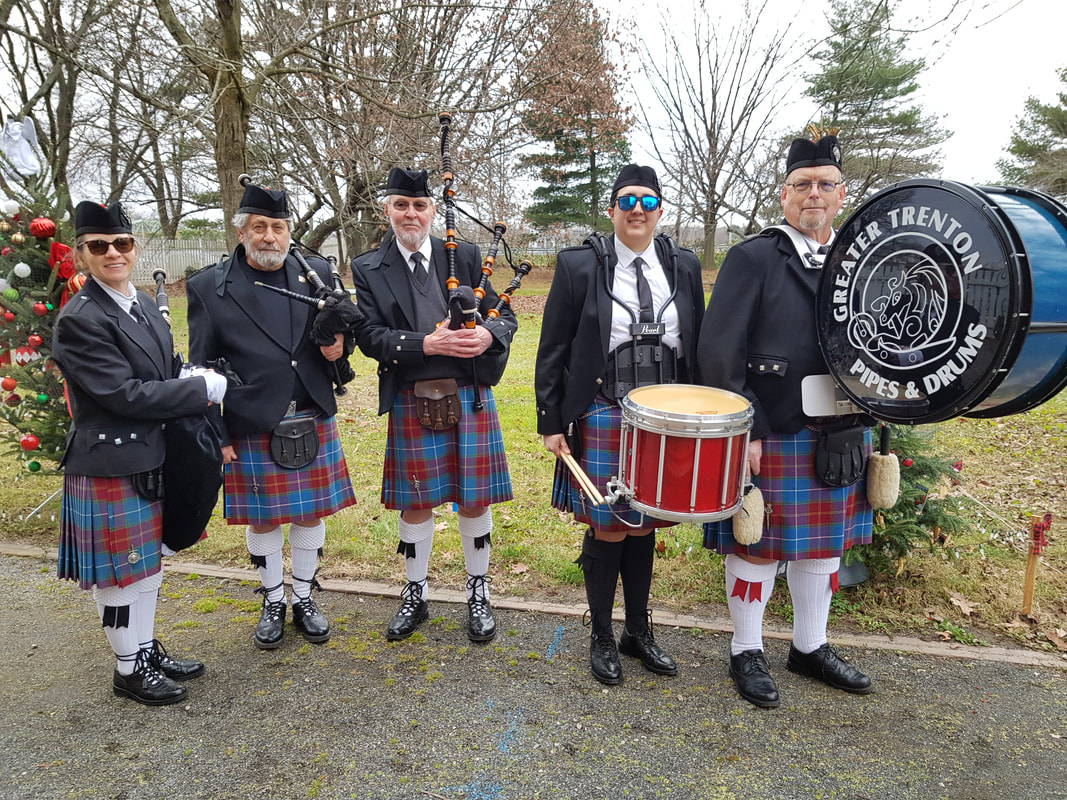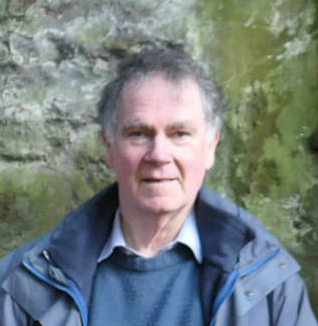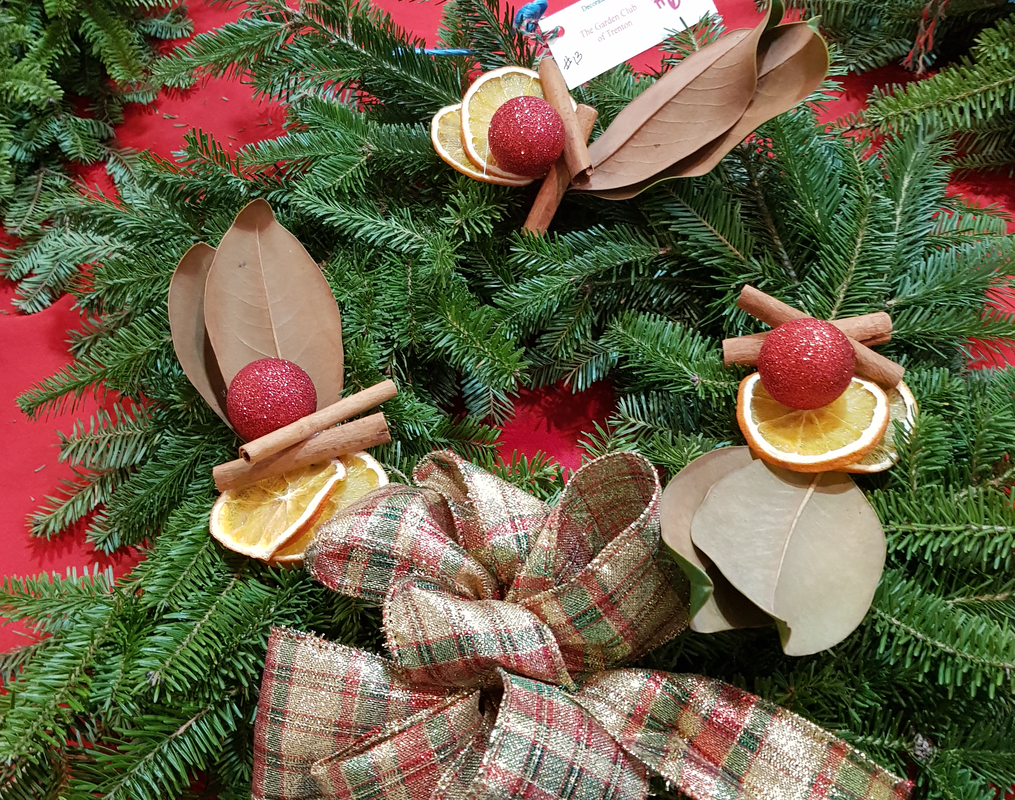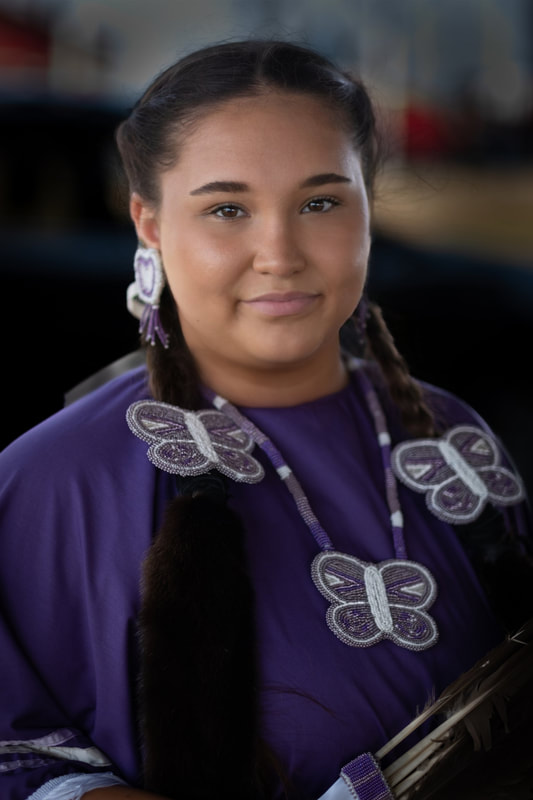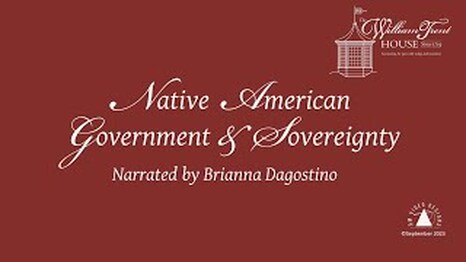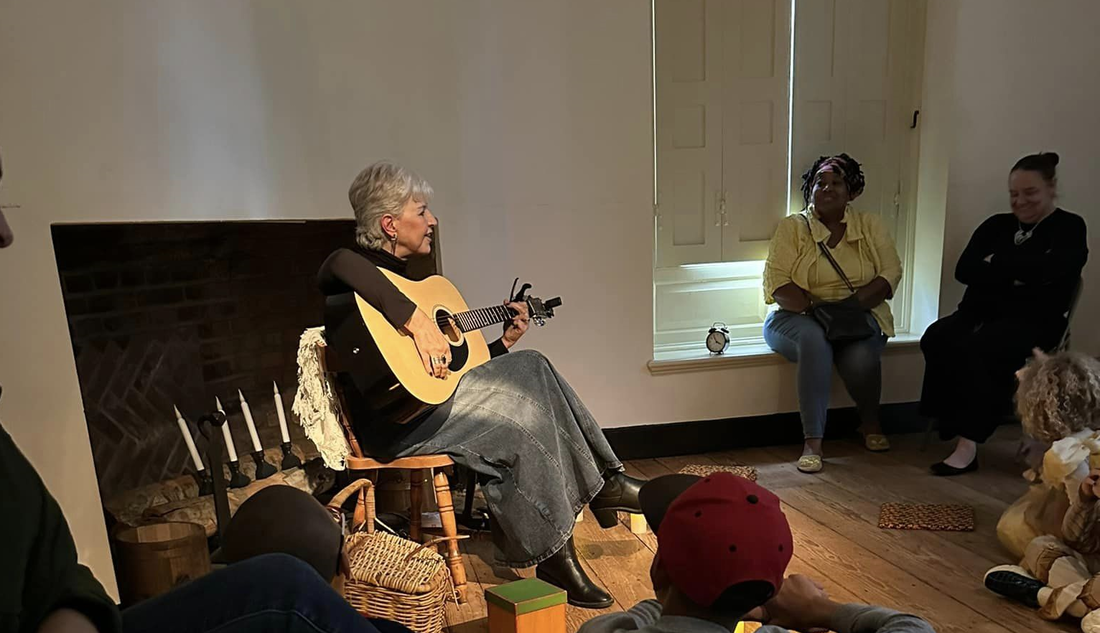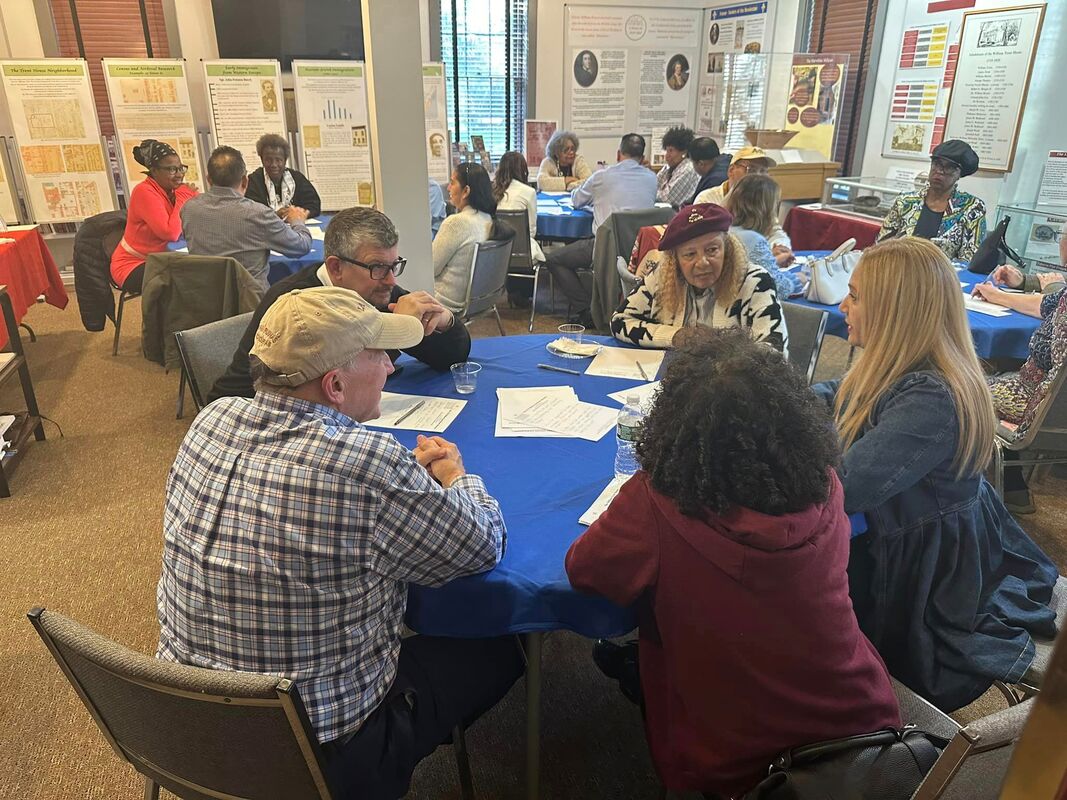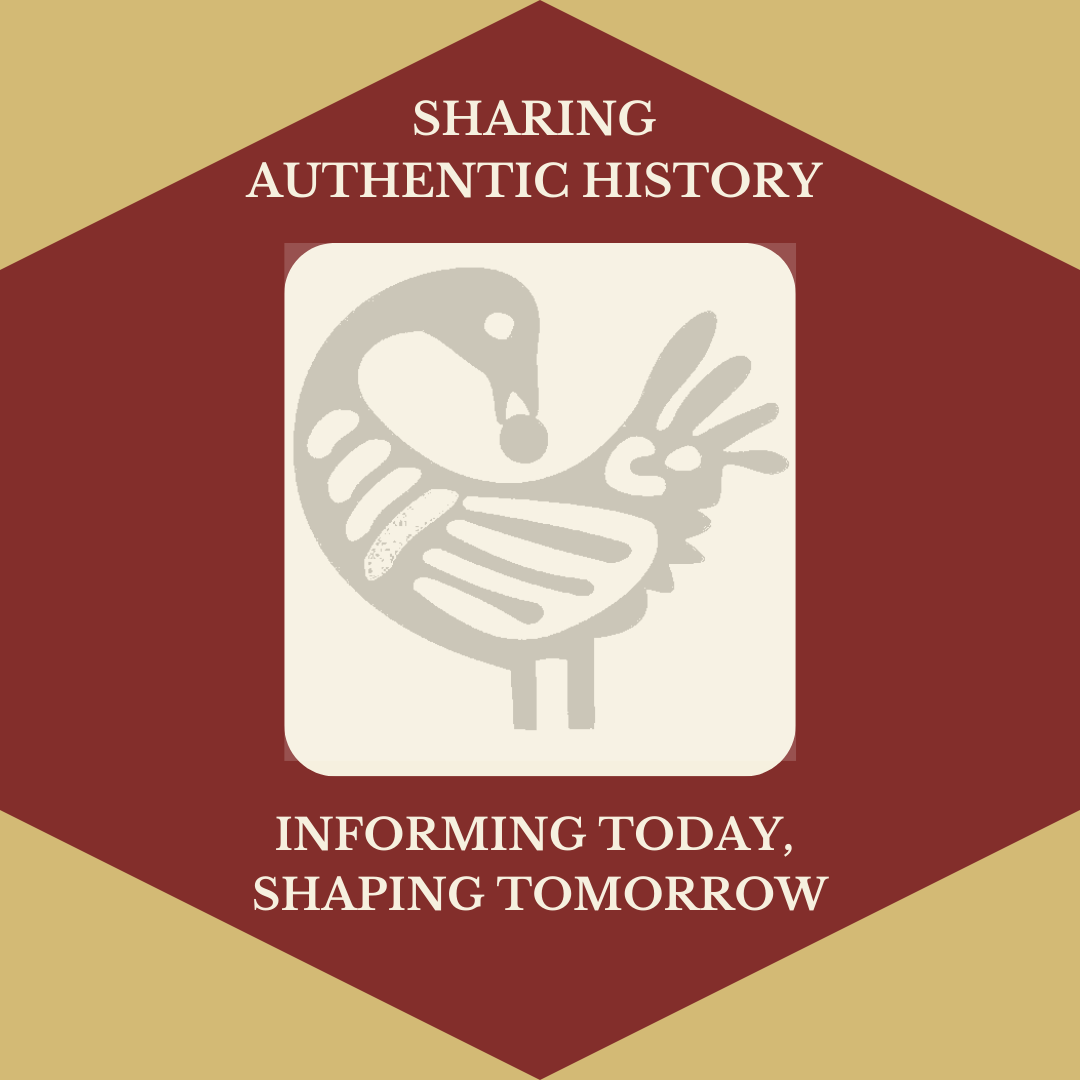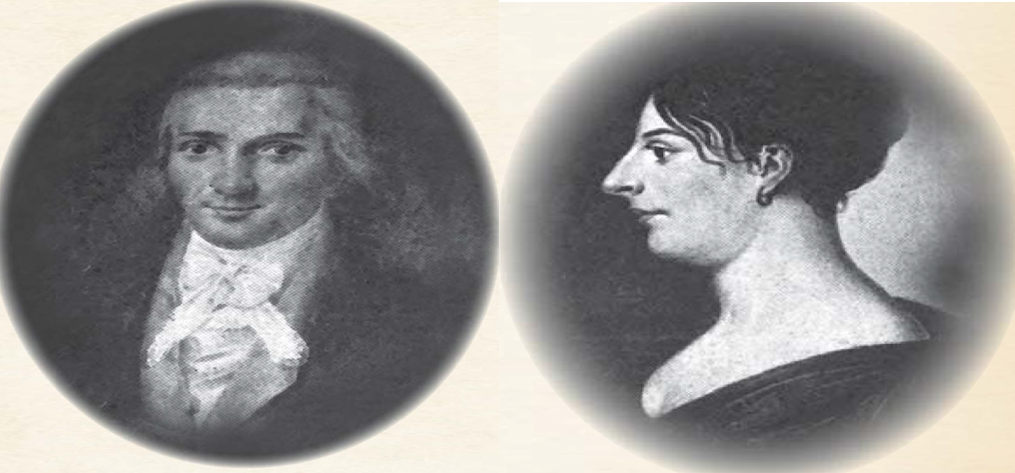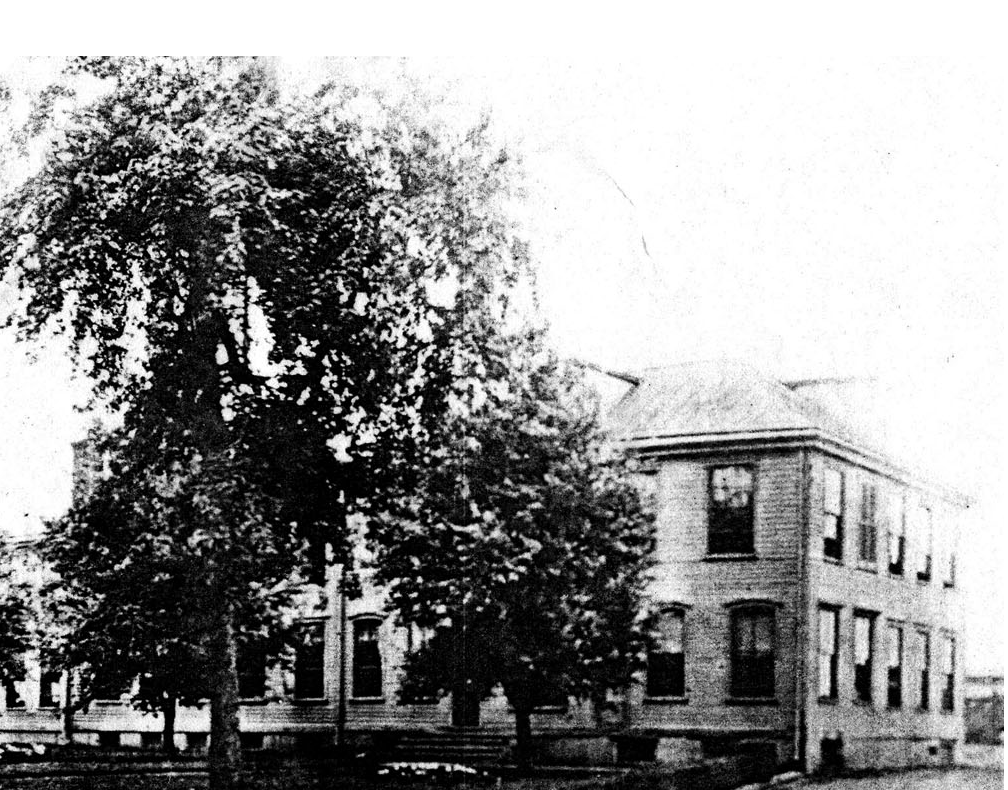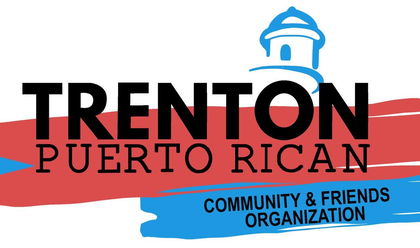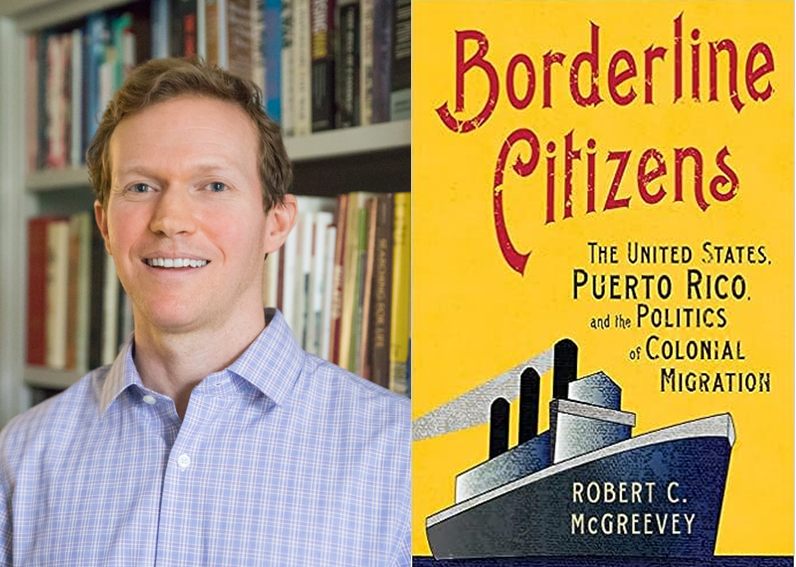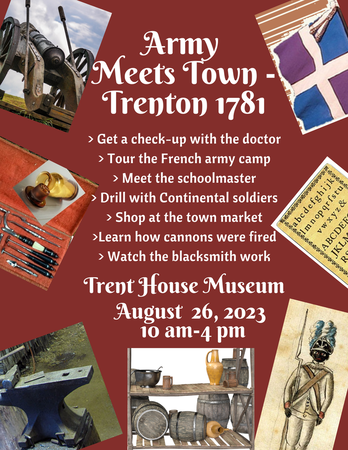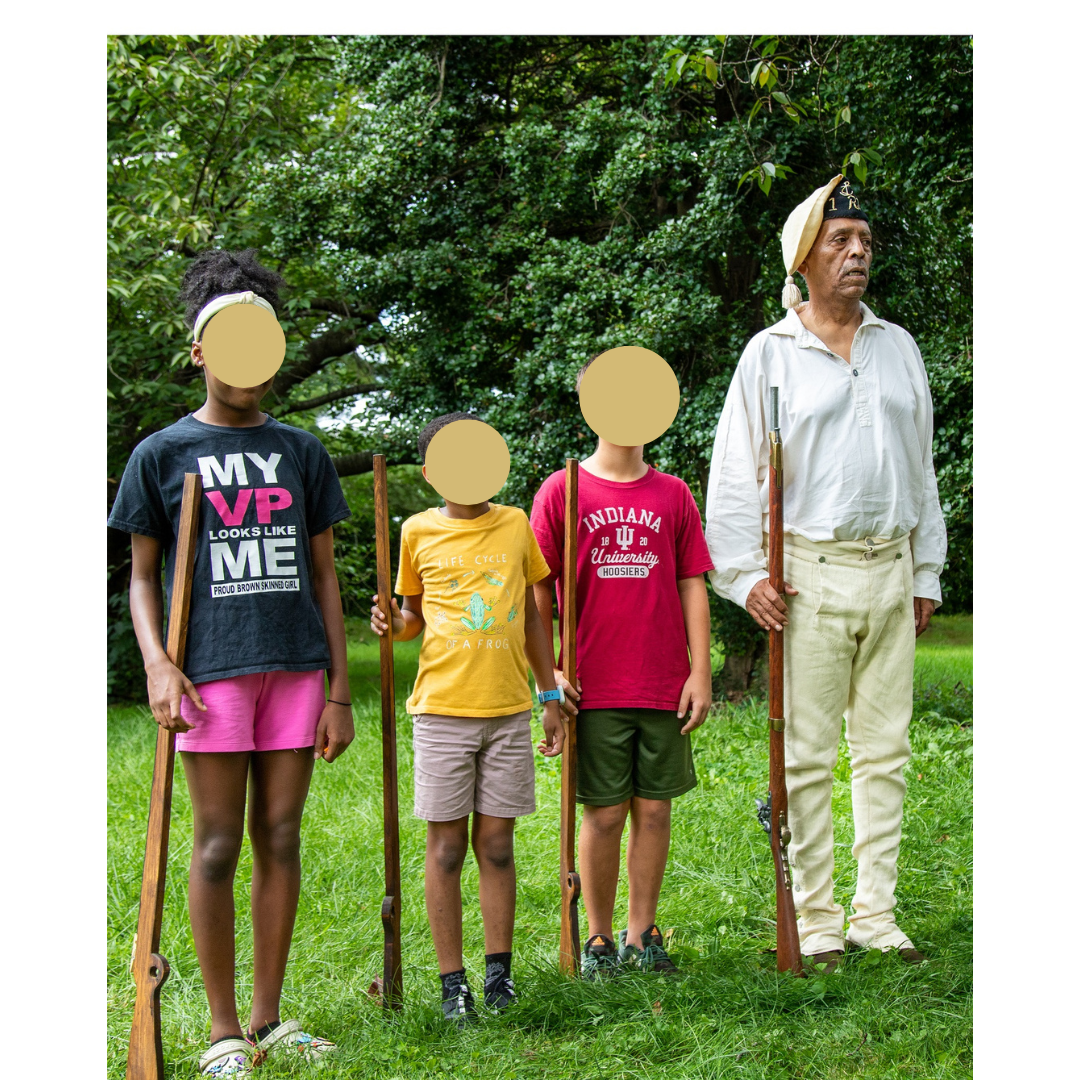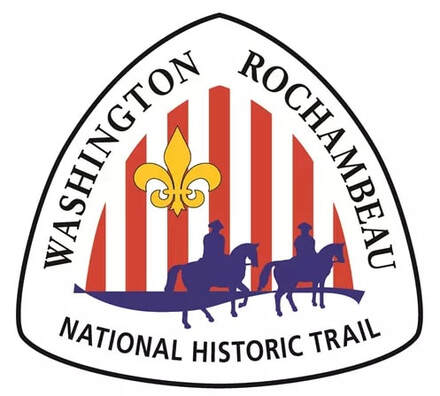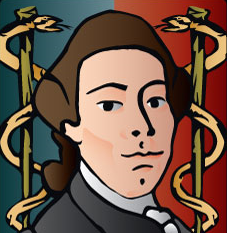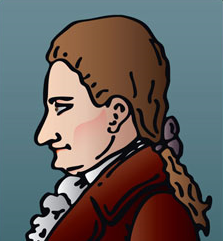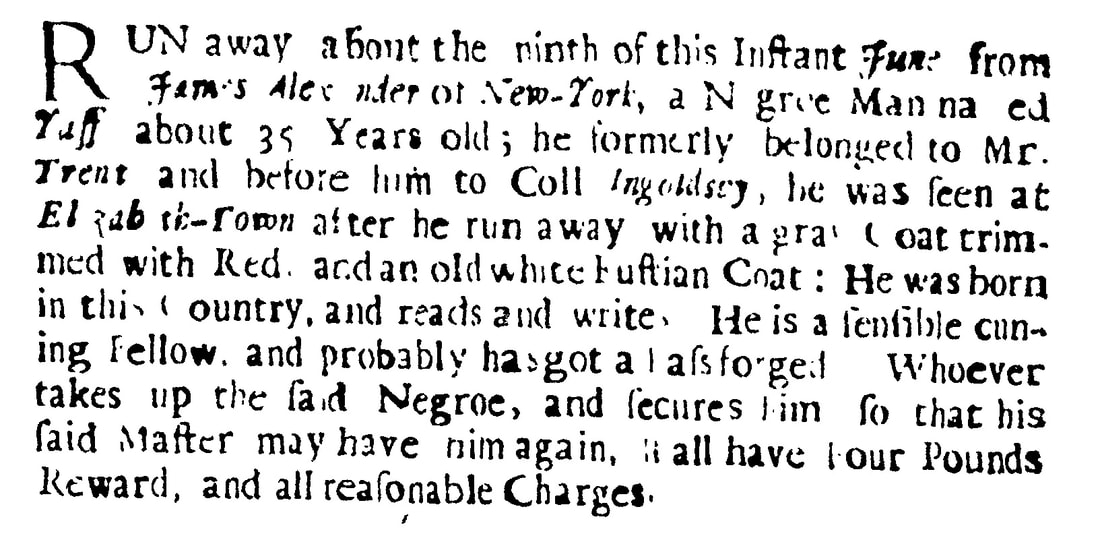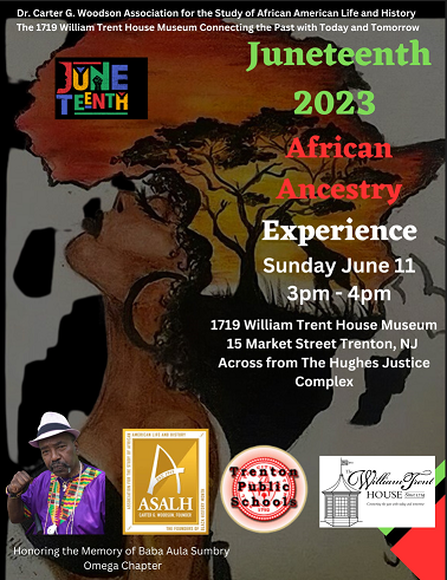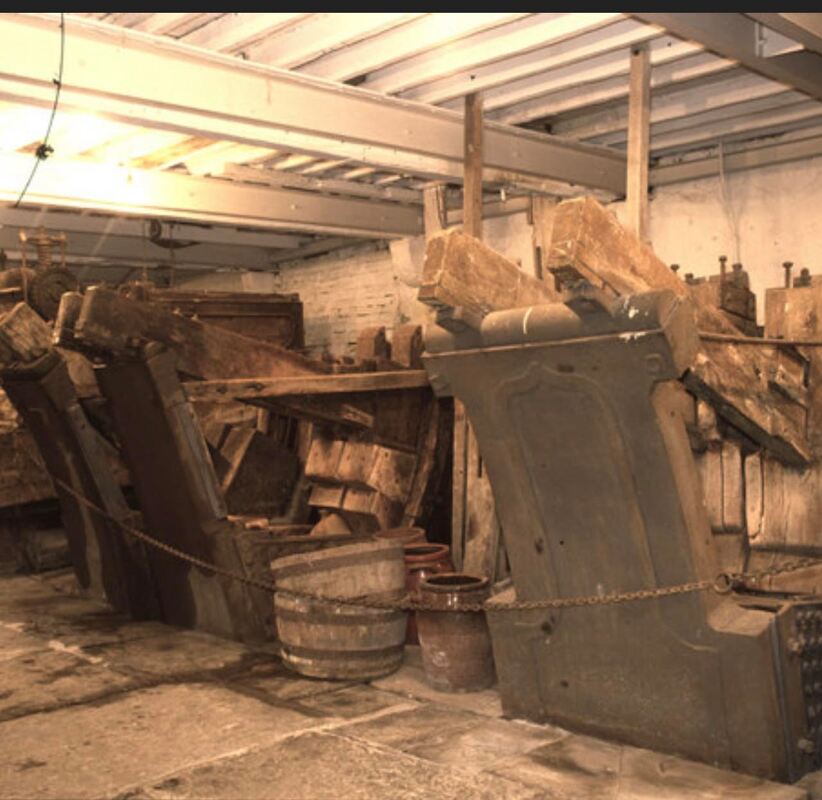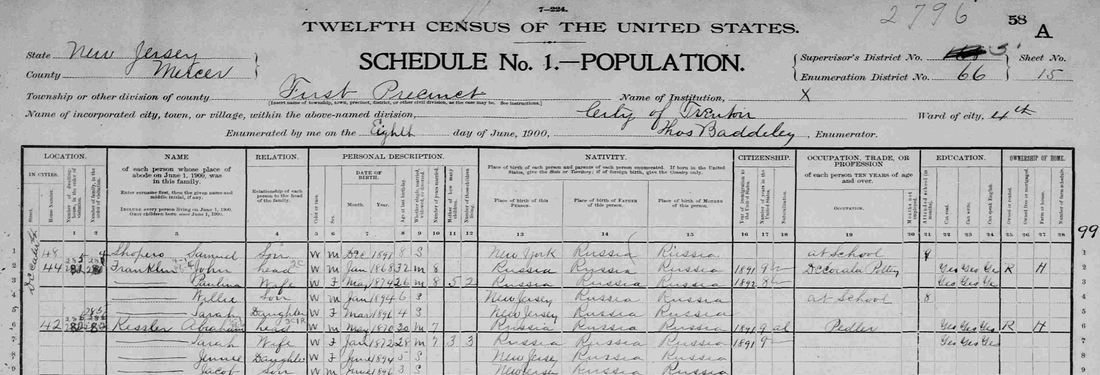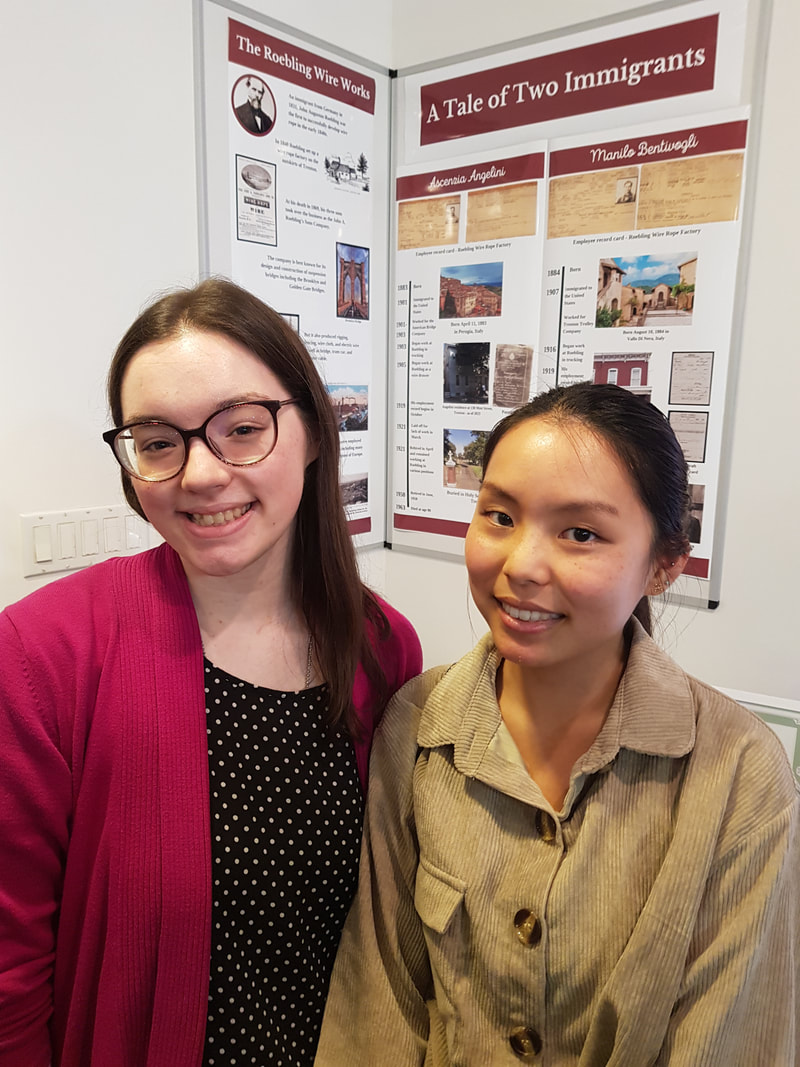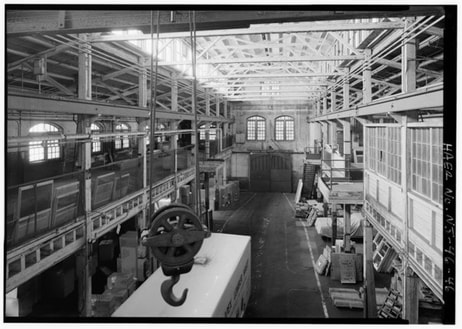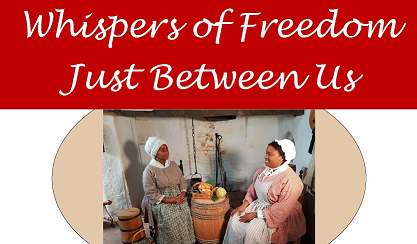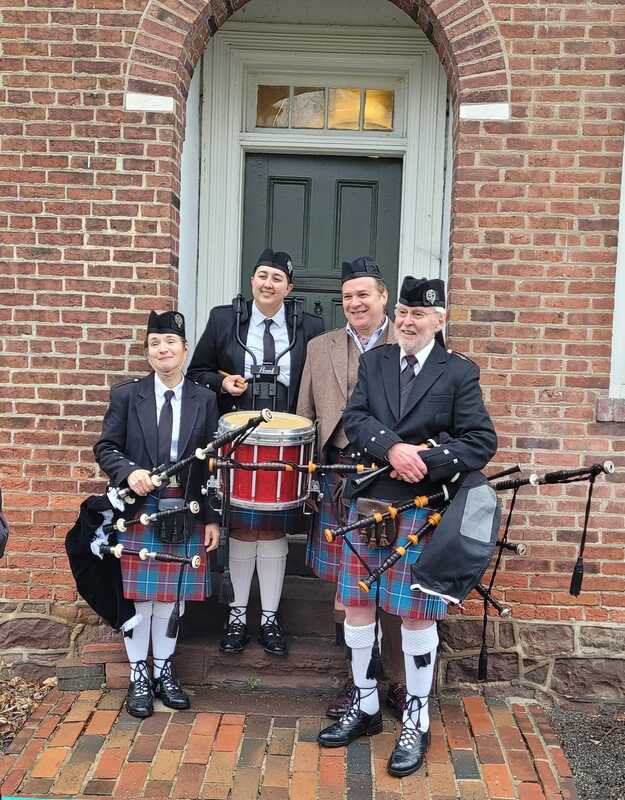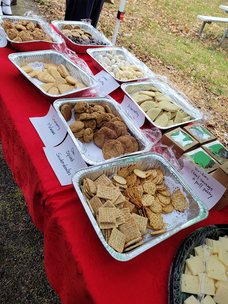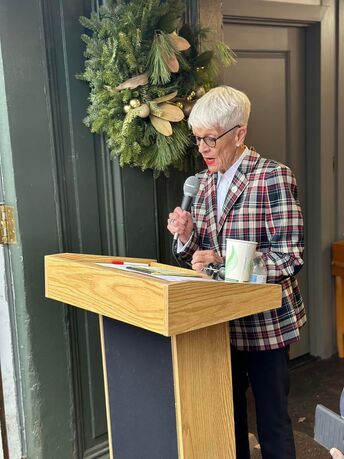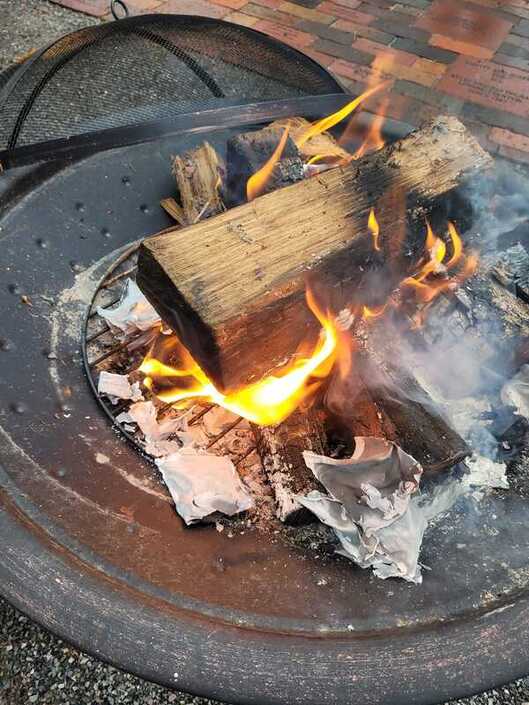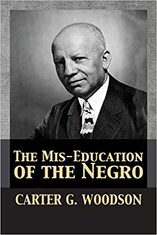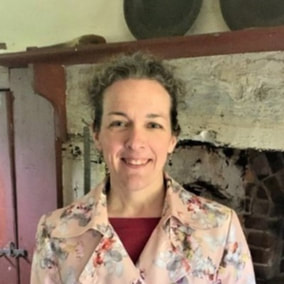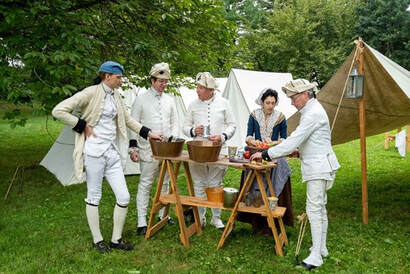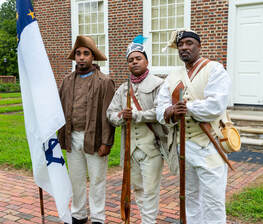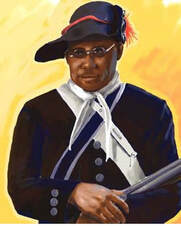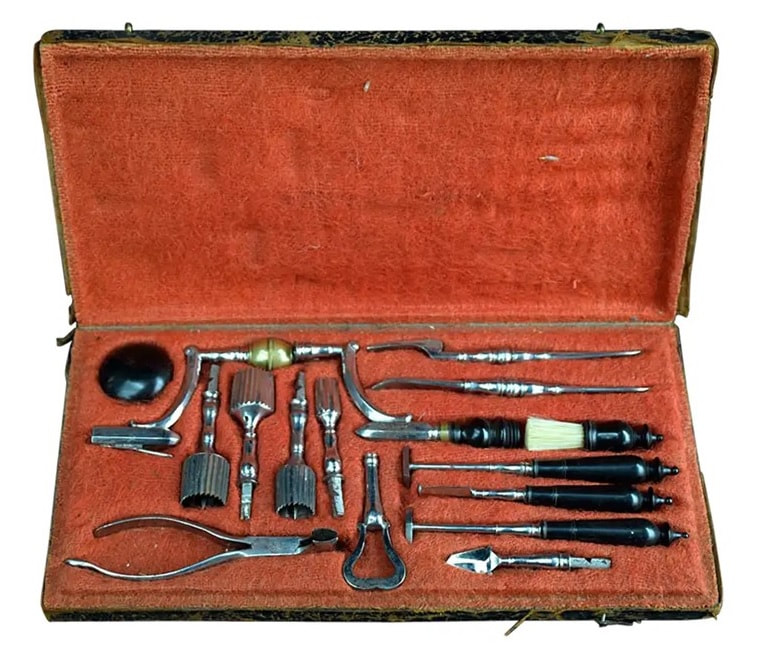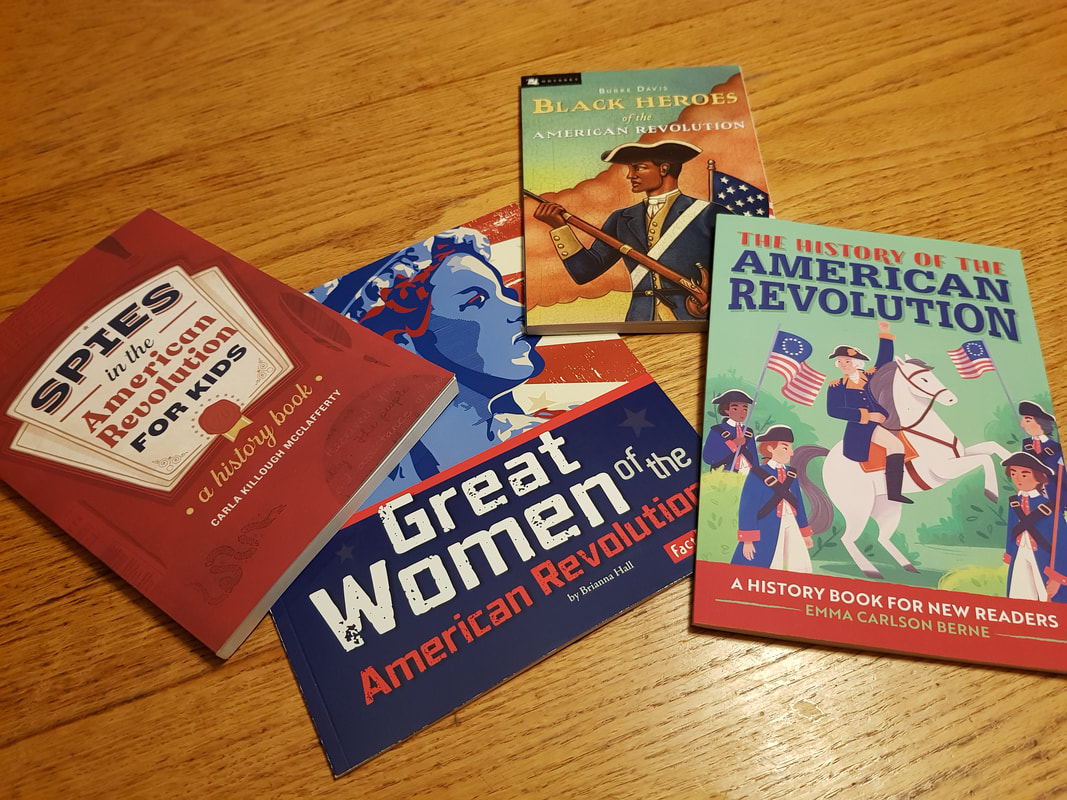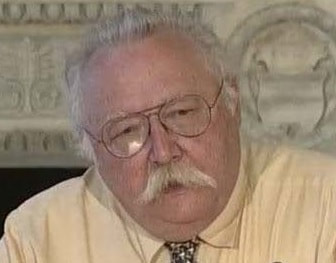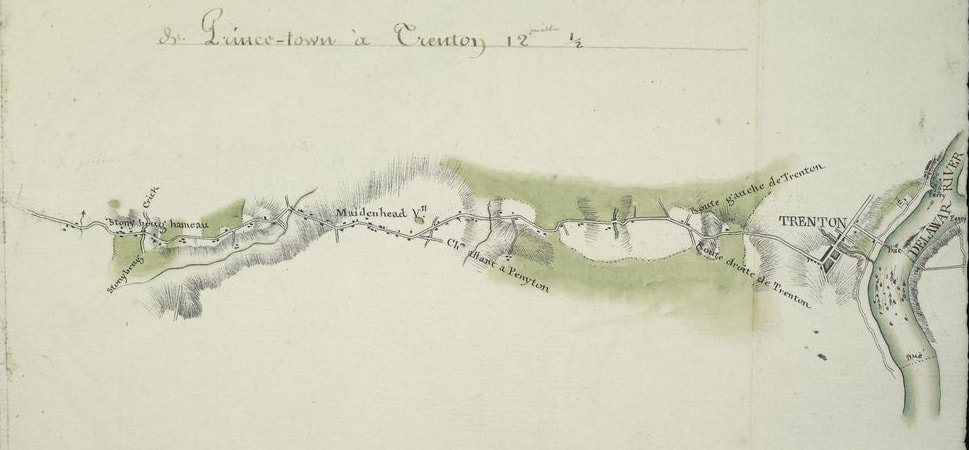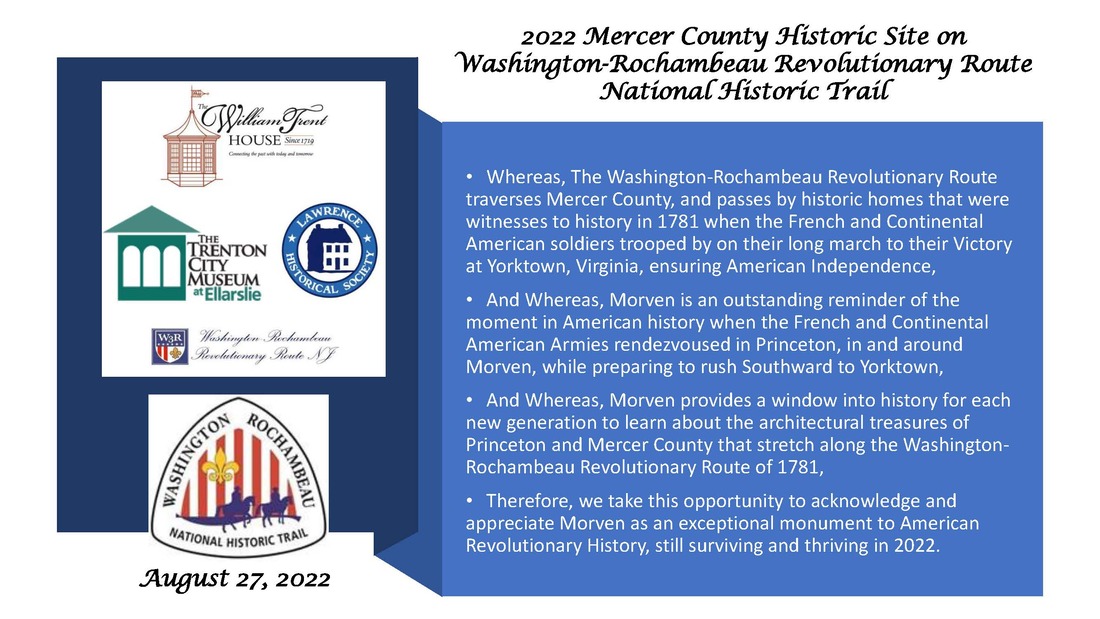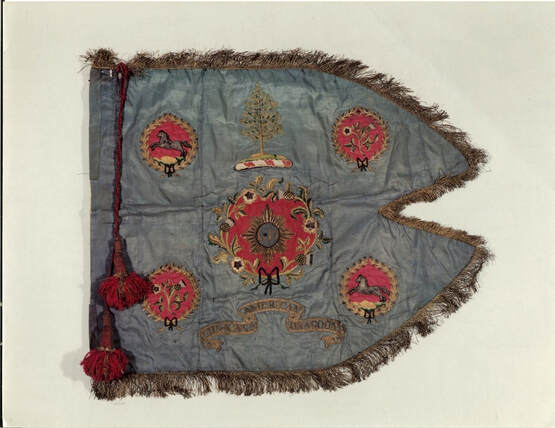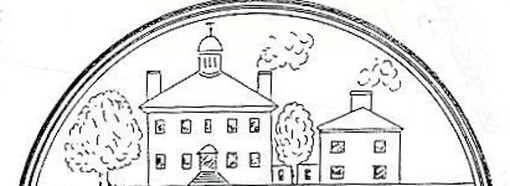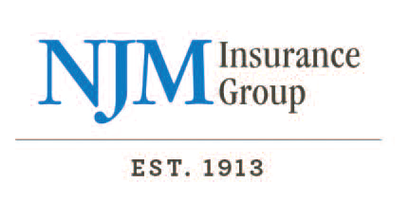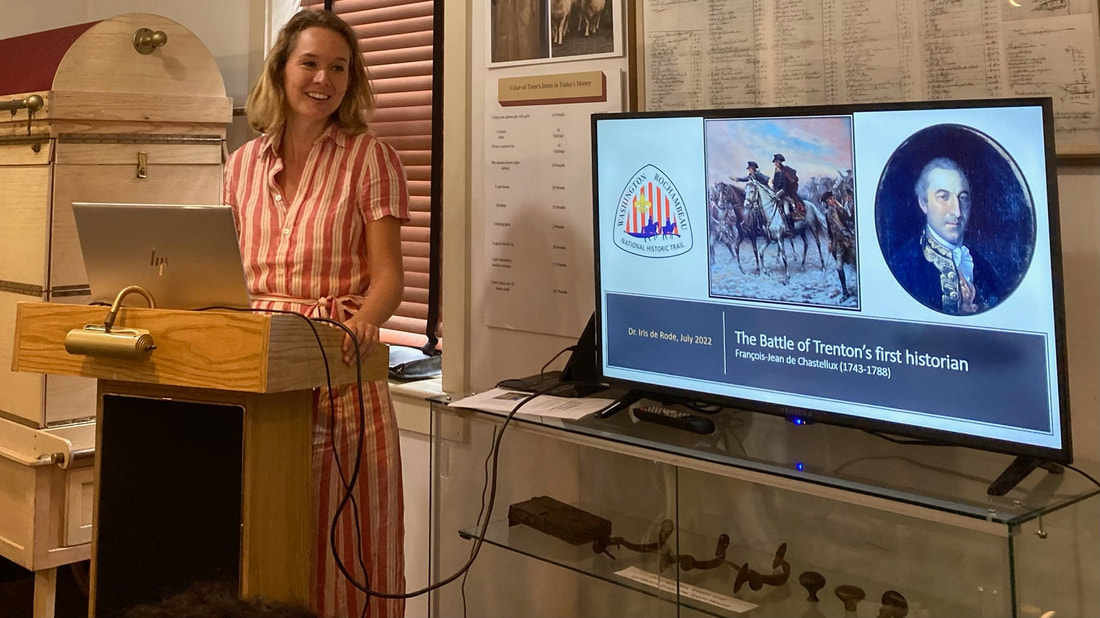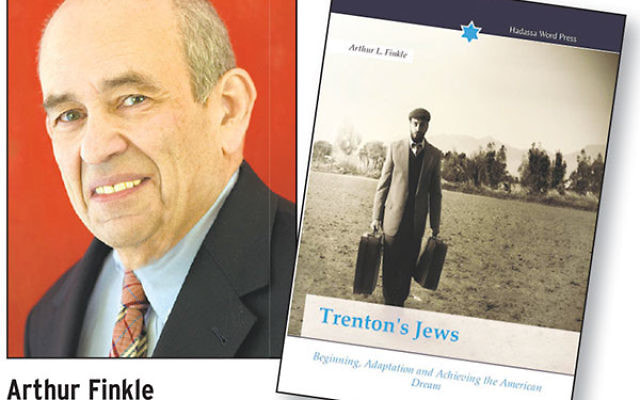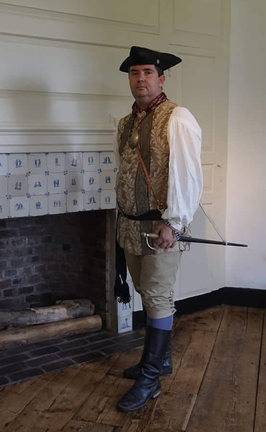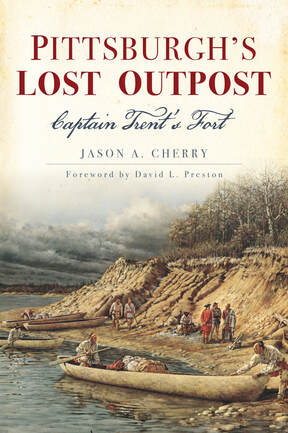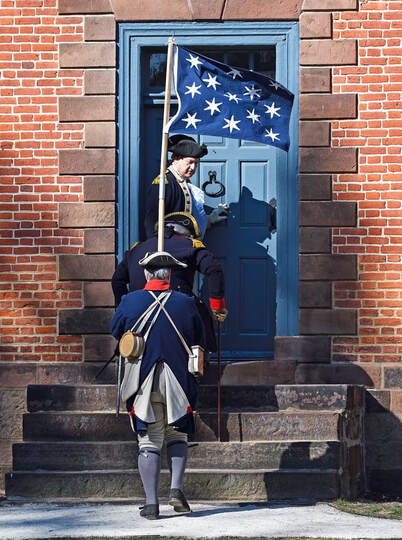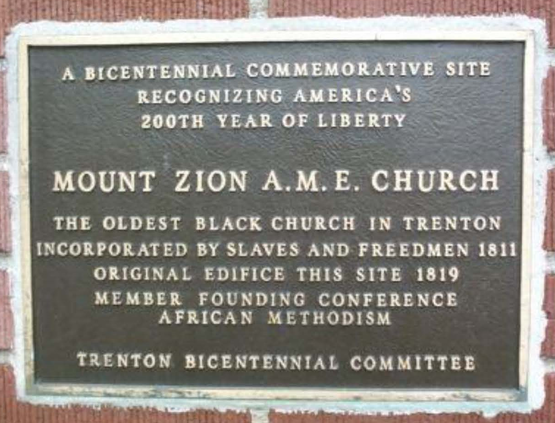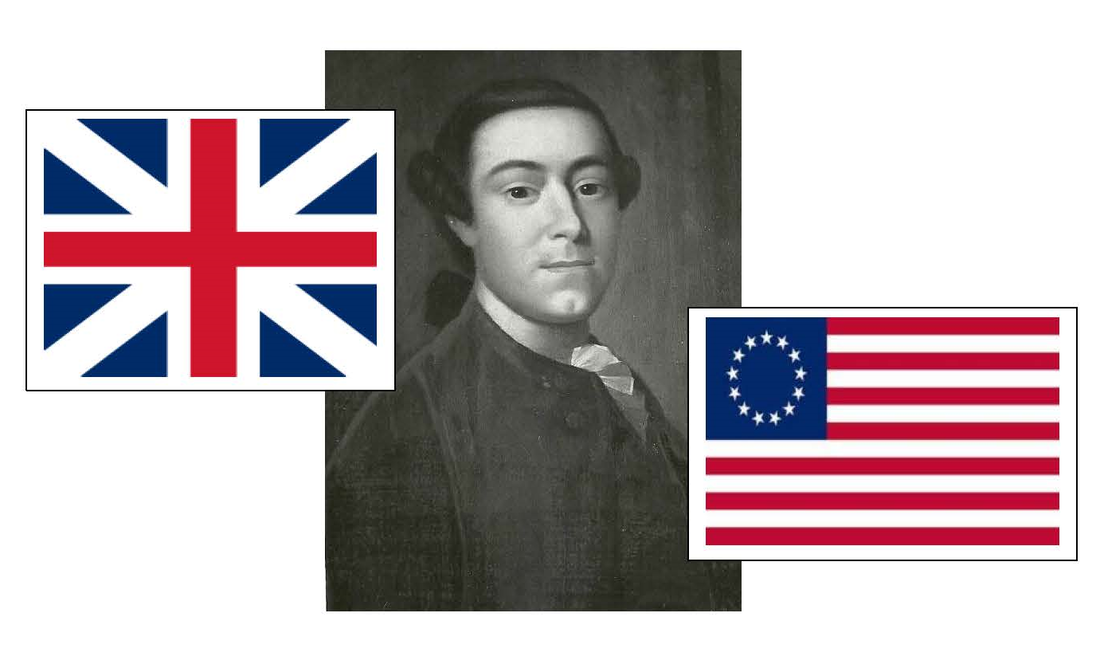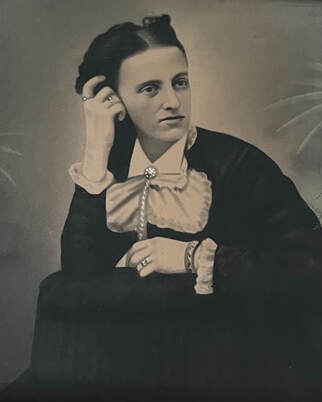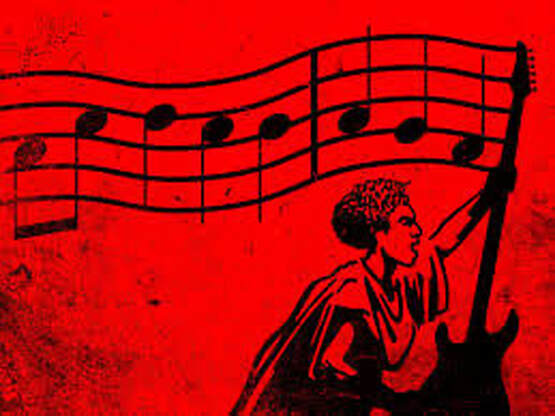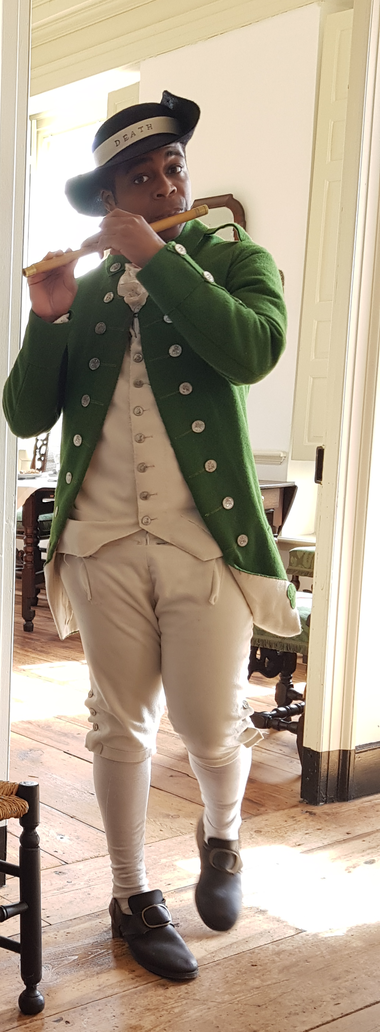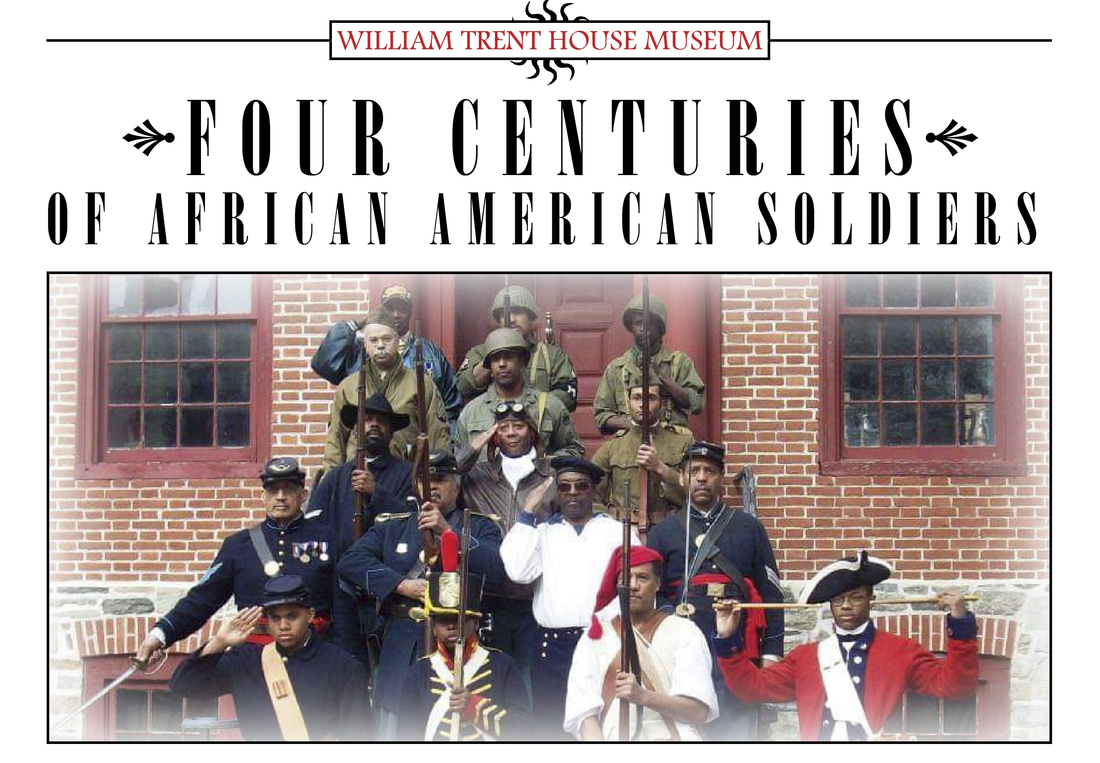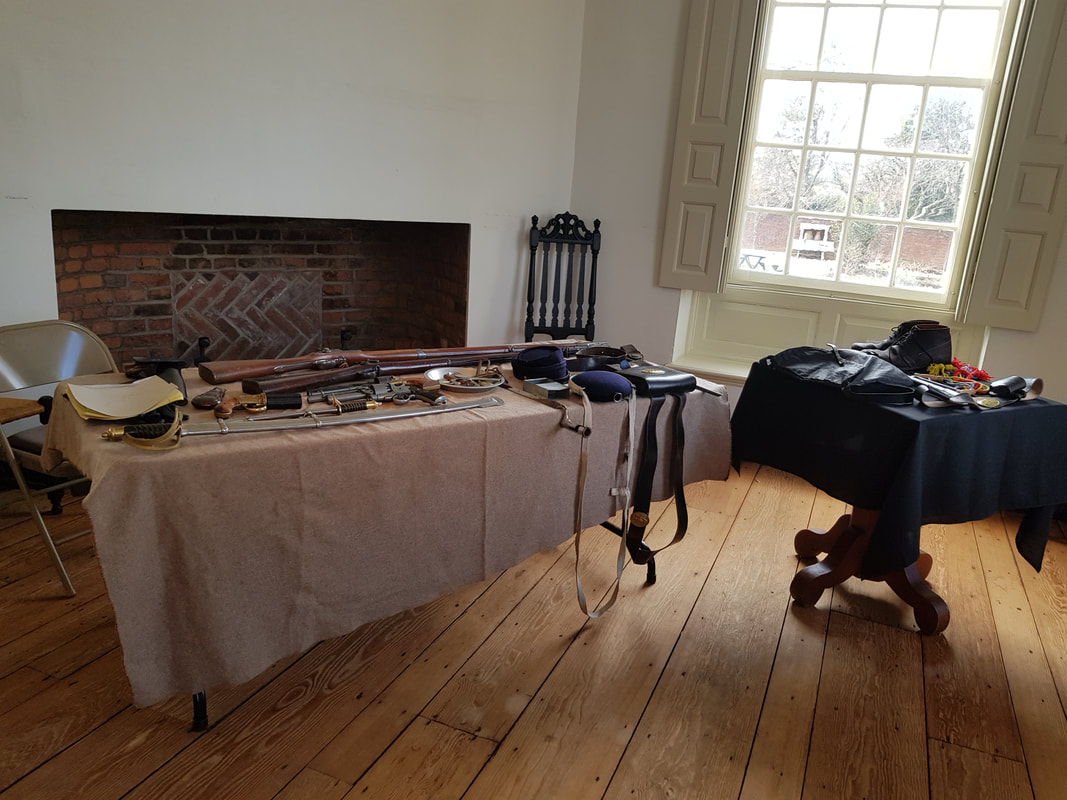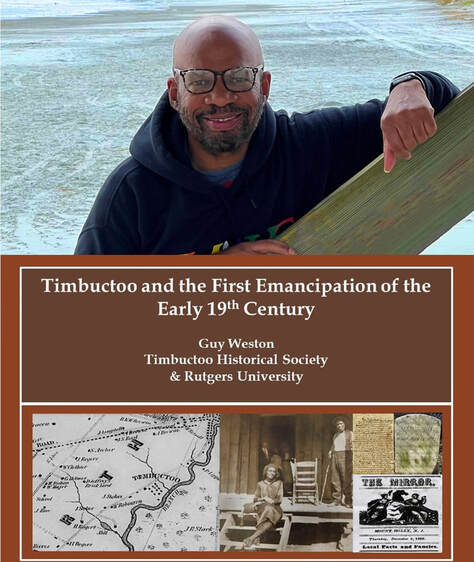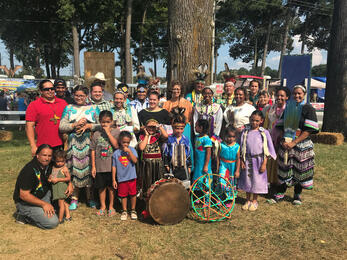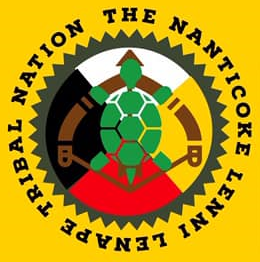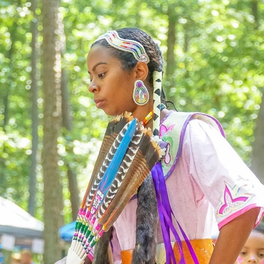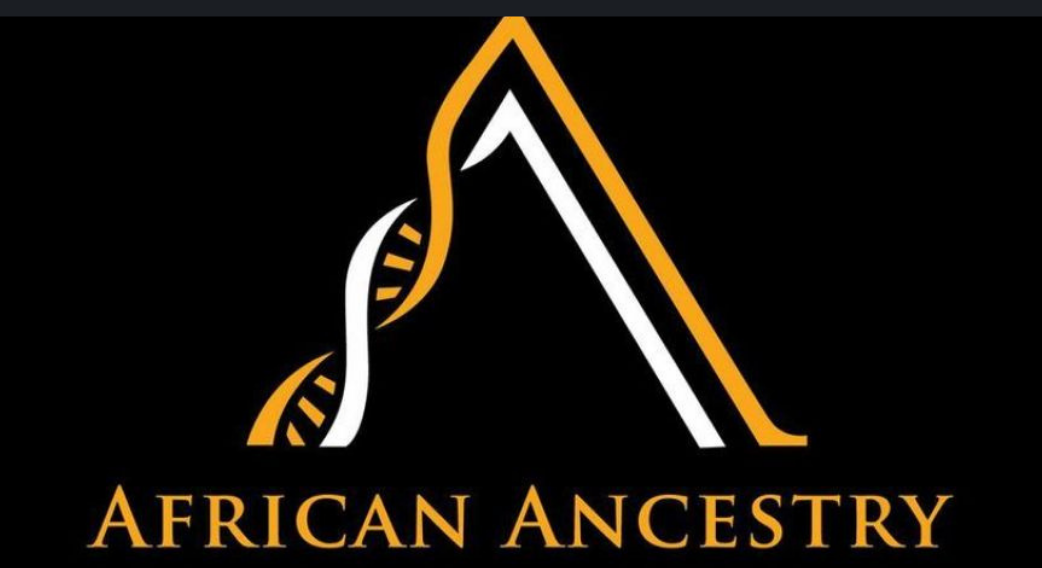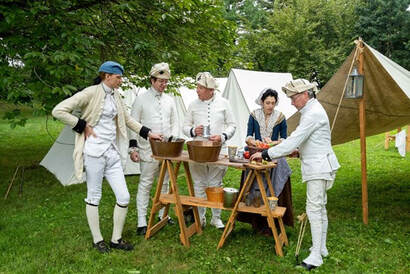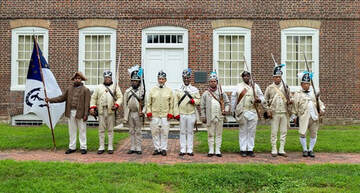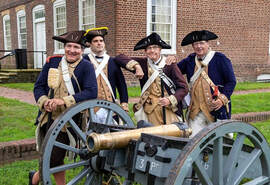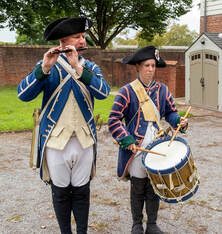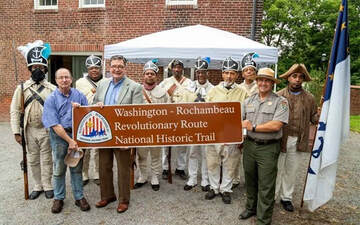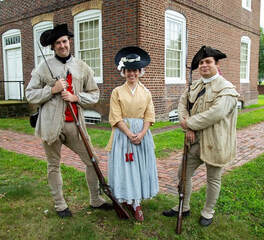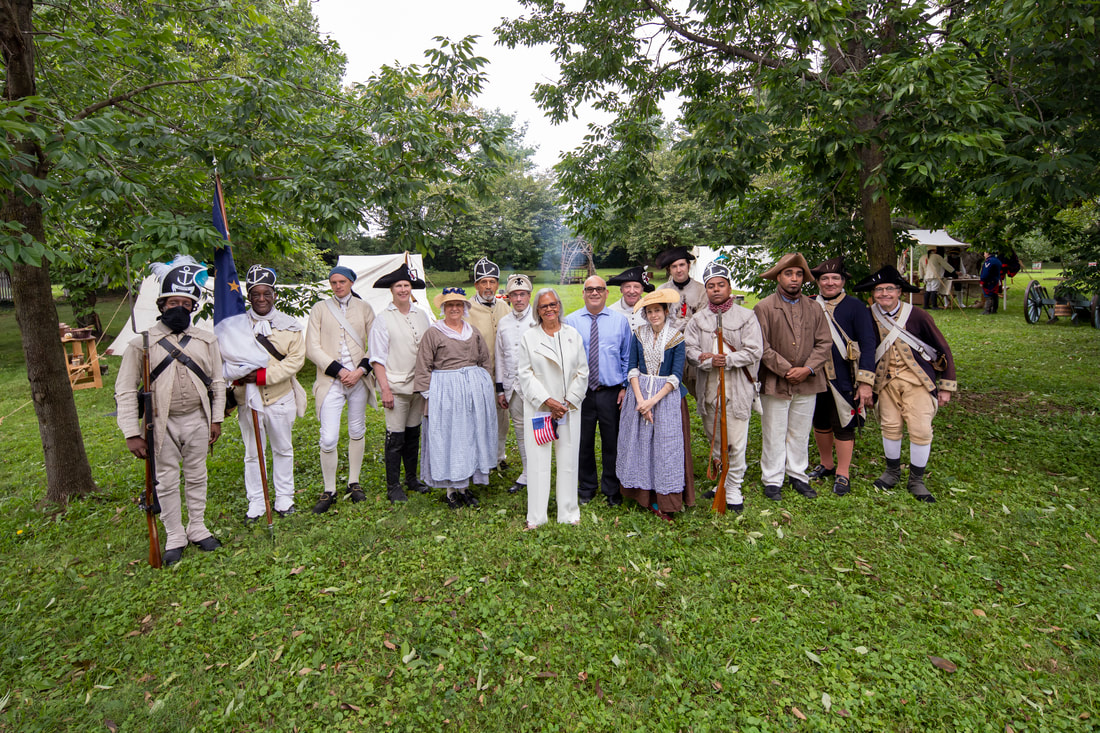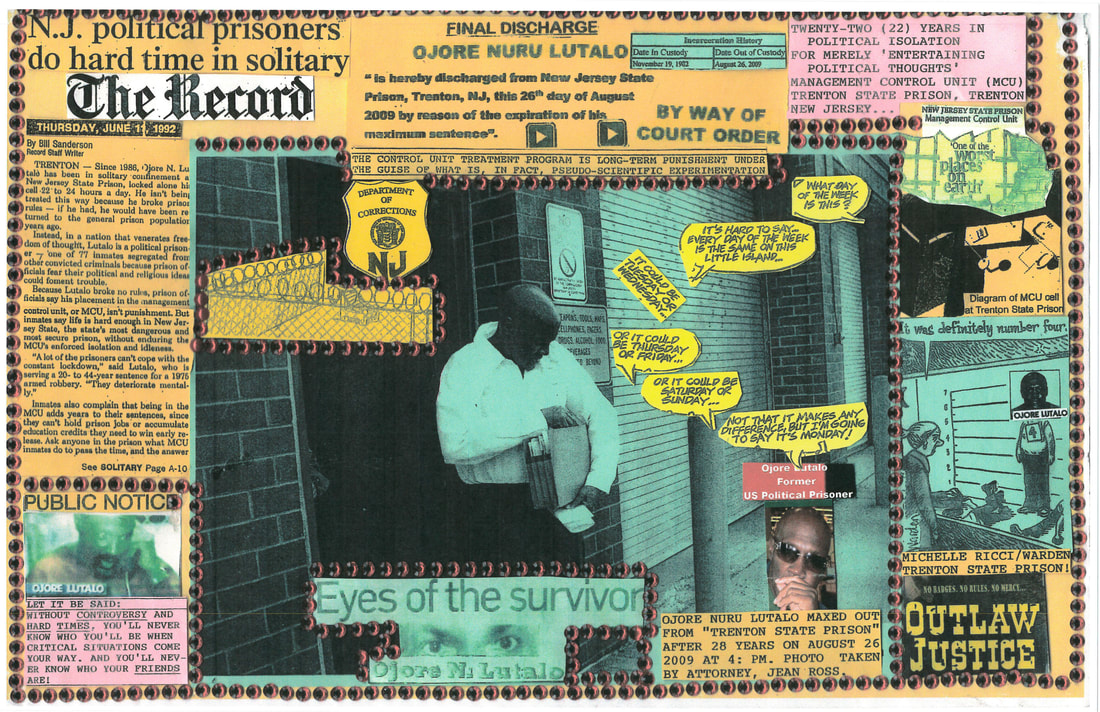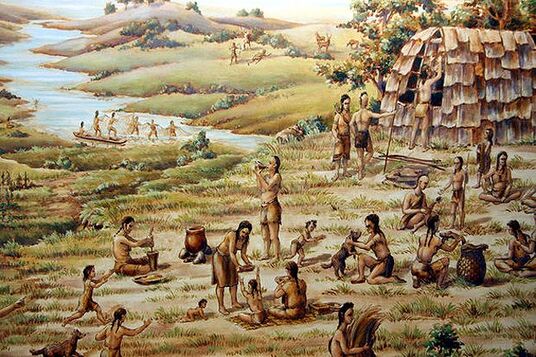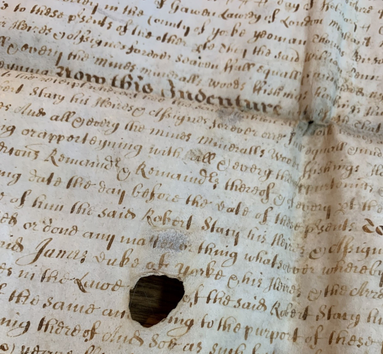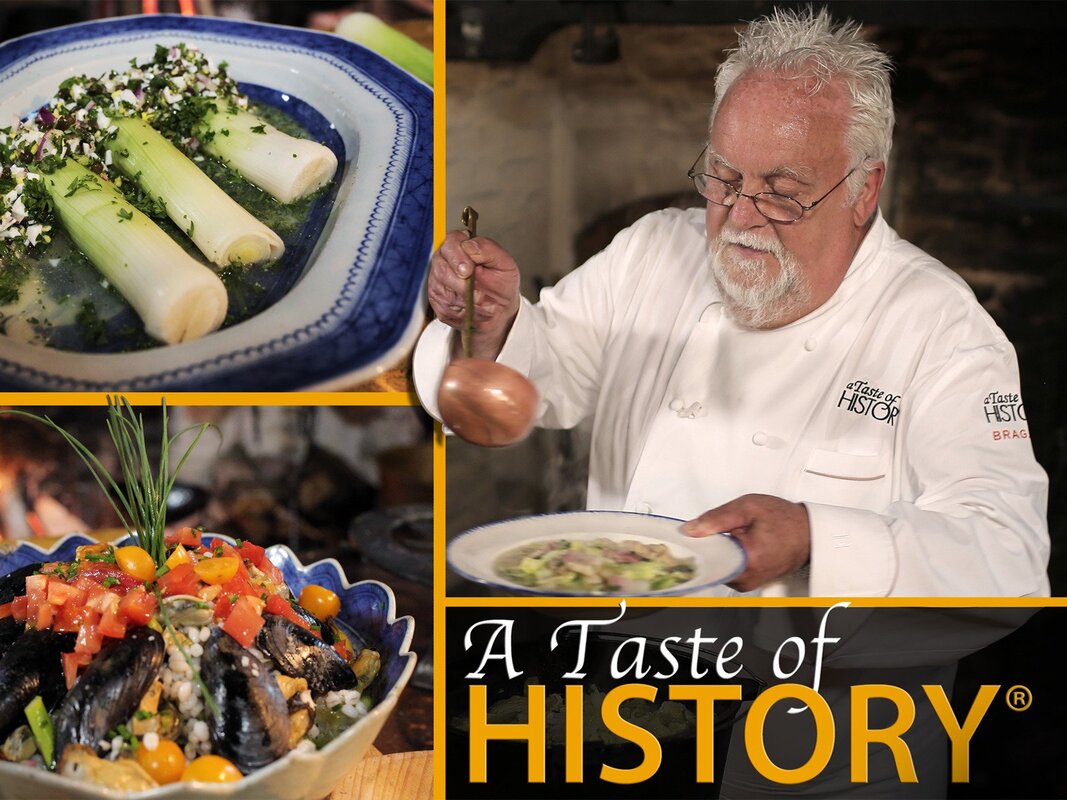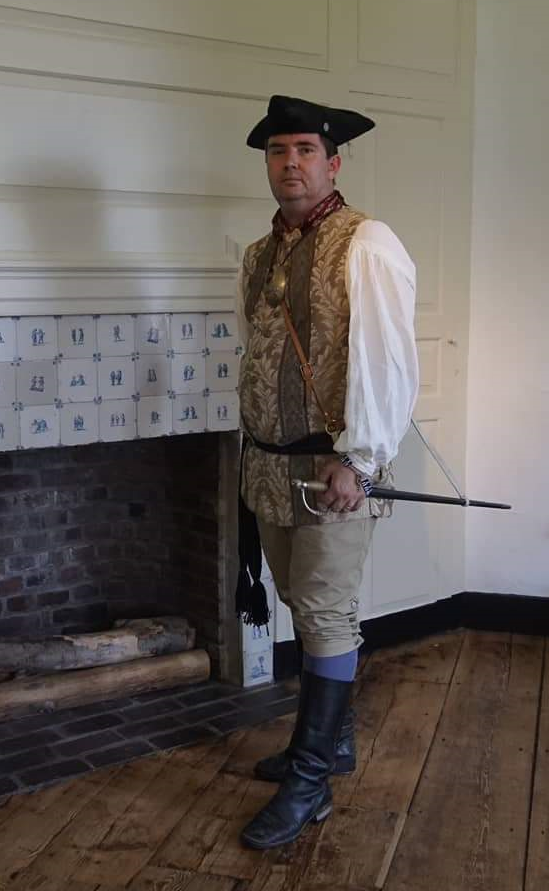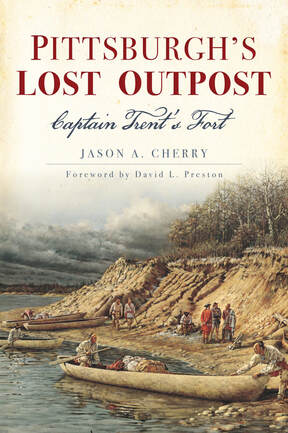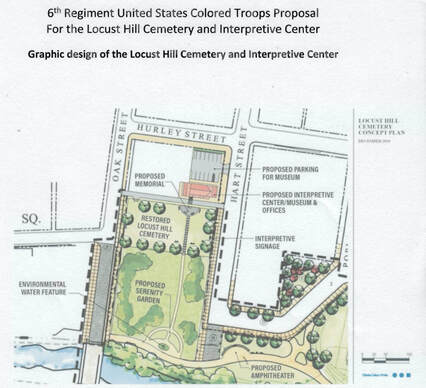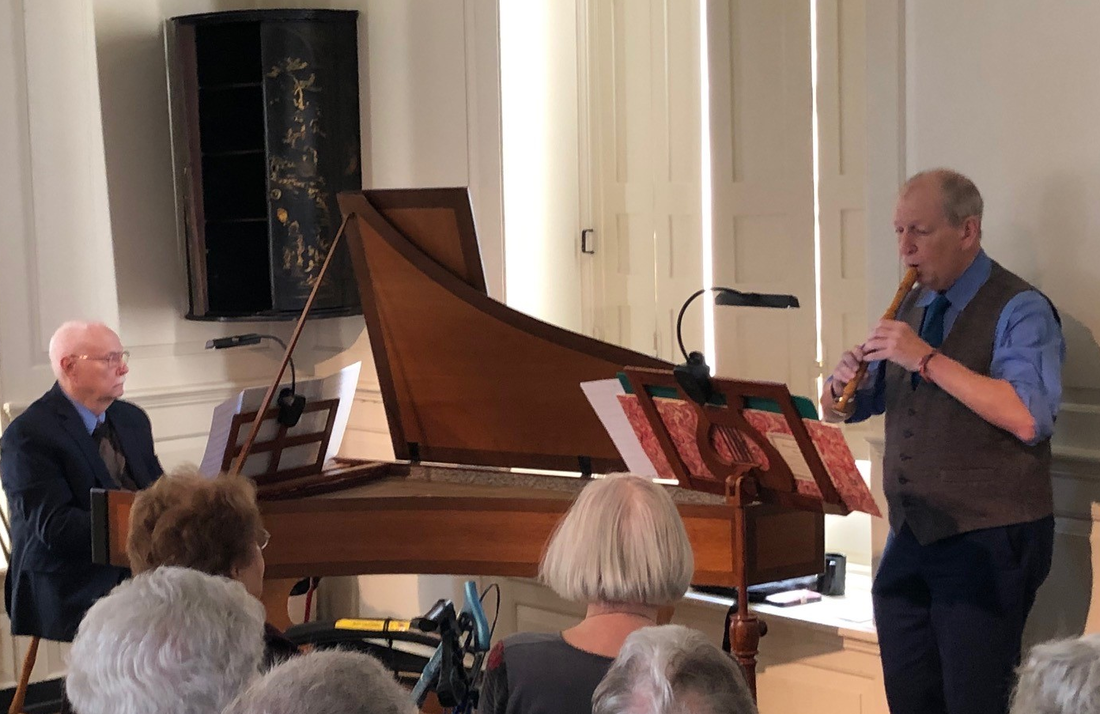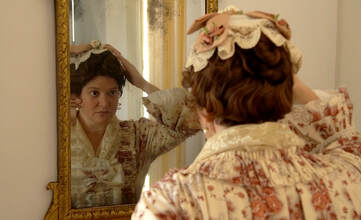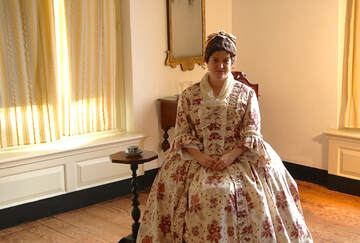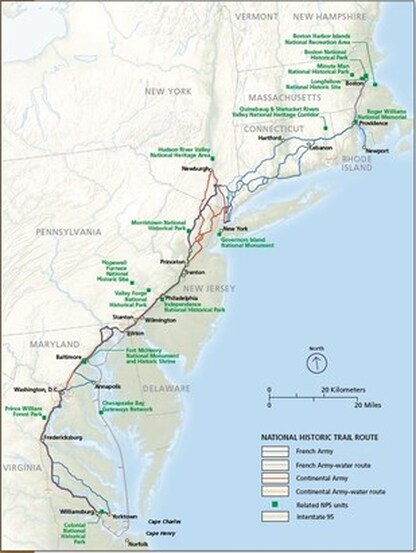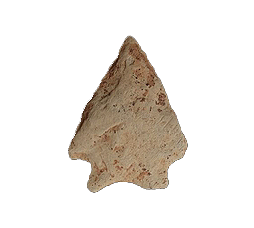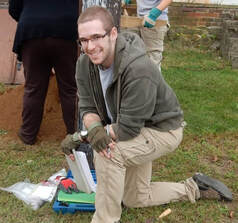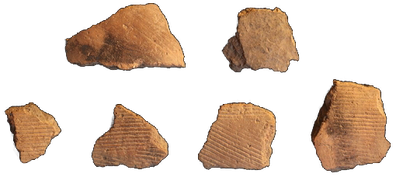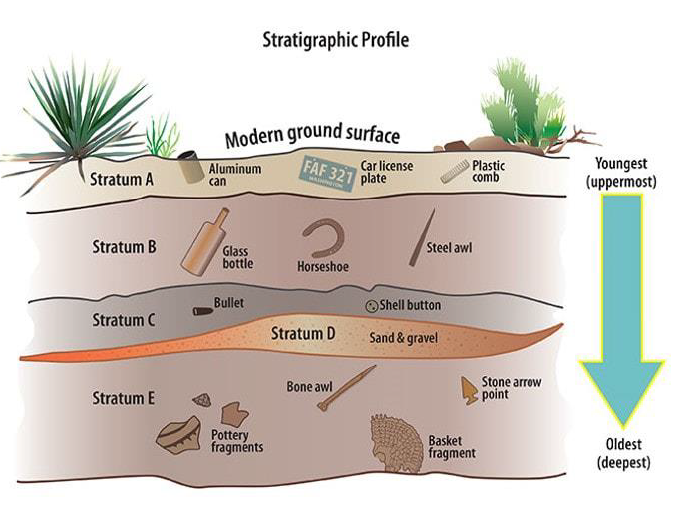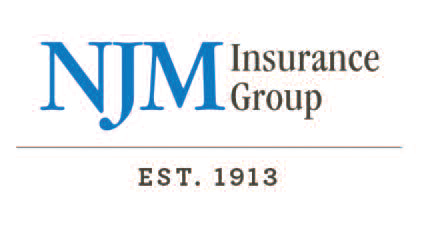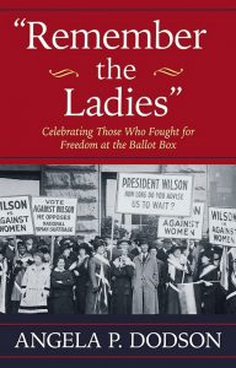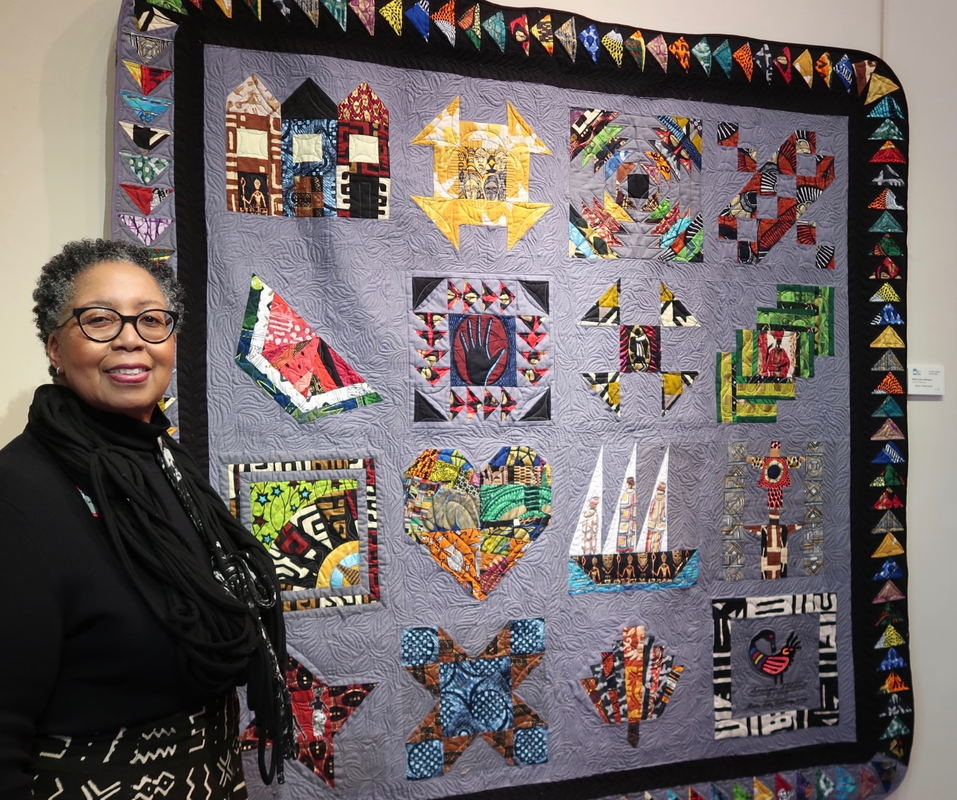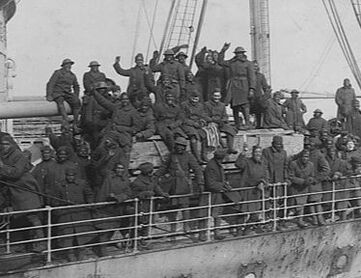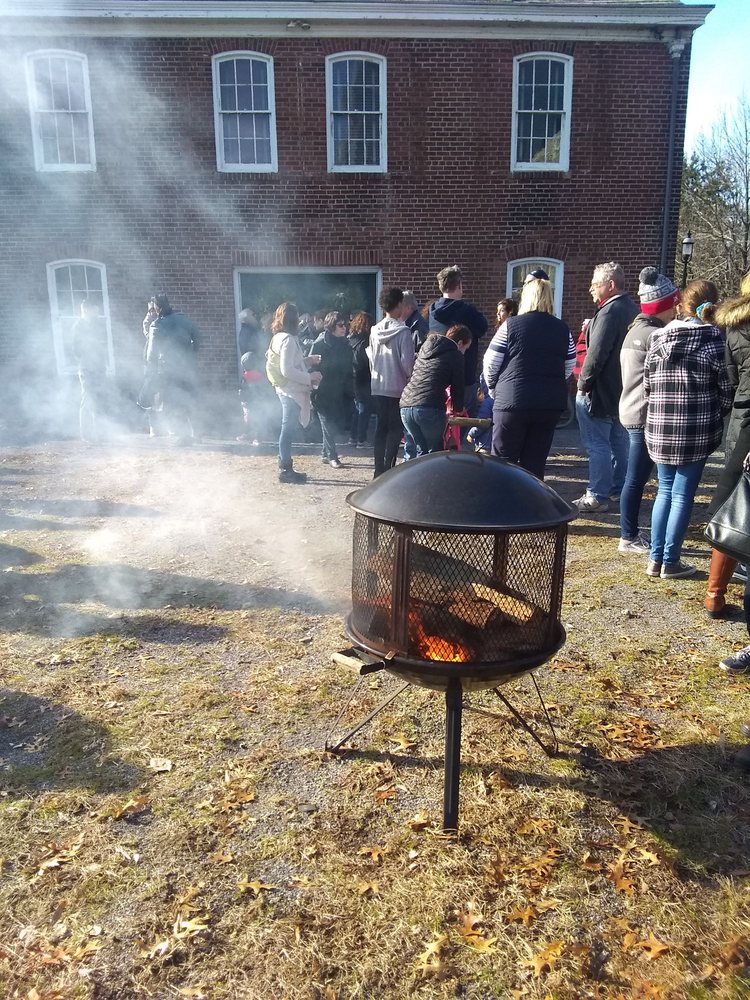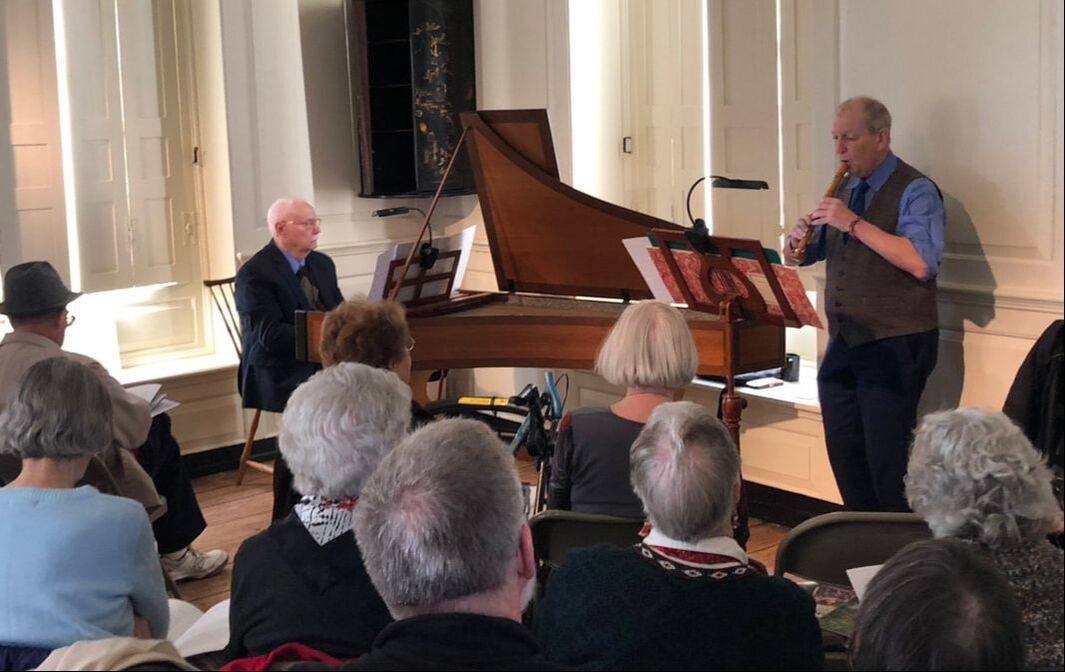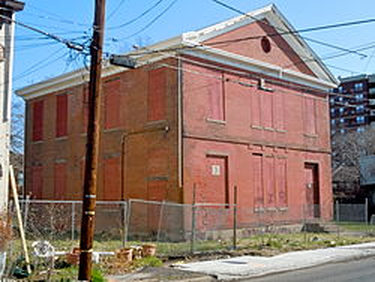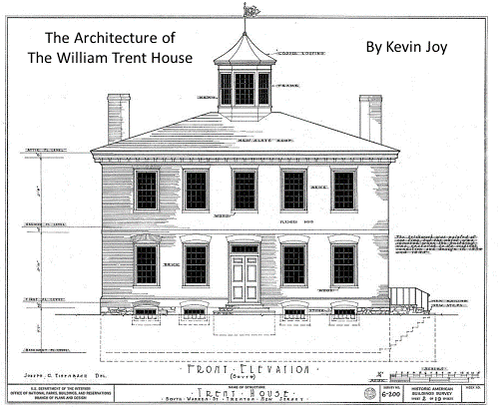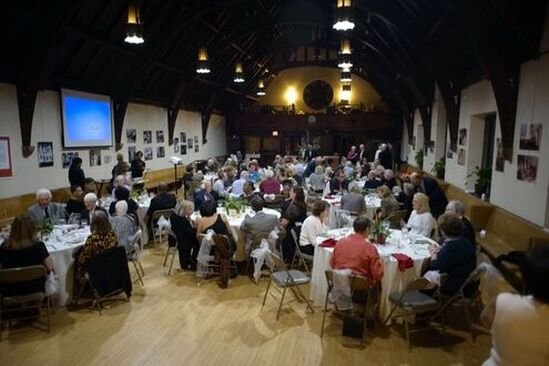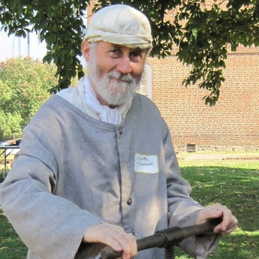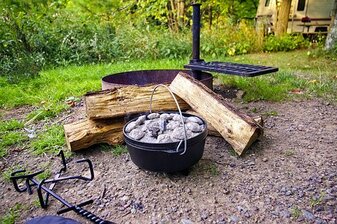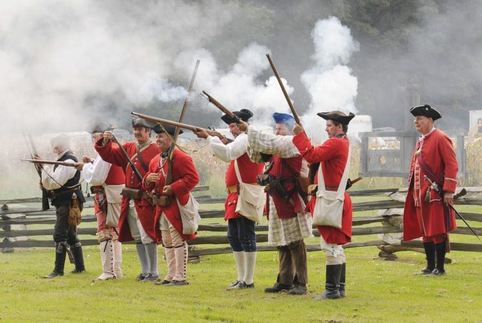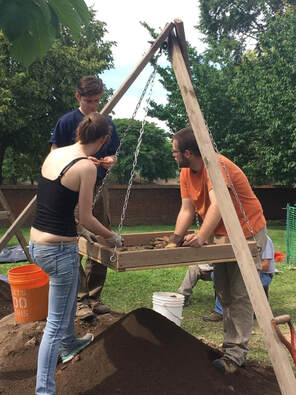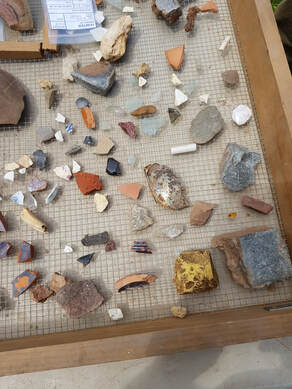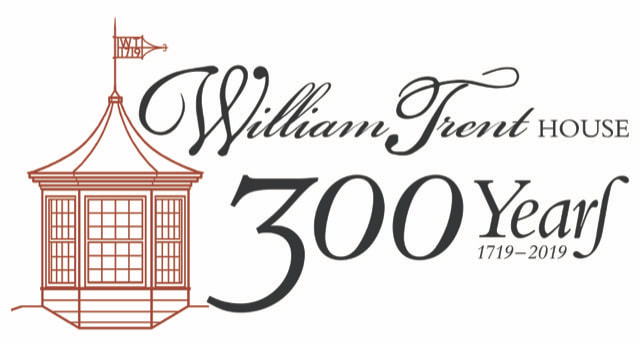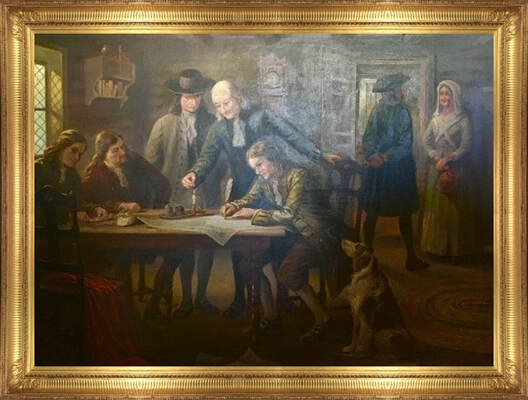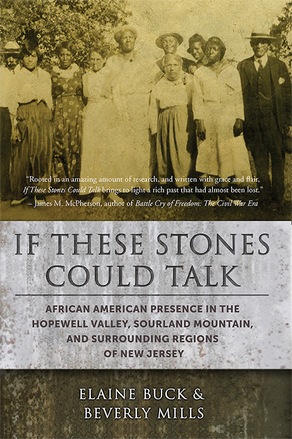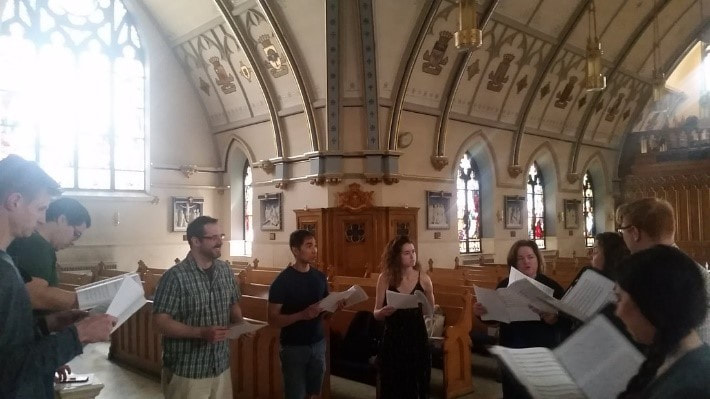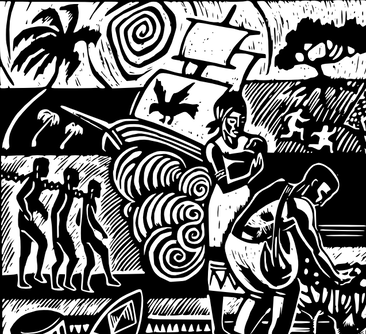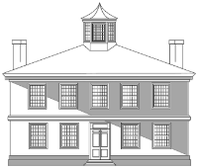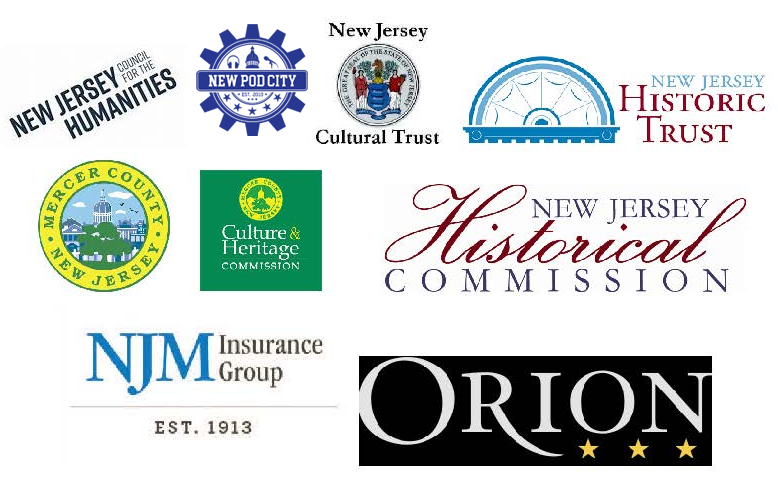Past Events
The Trent House hosts lectures on a wide range of historical topics, community and family programs, and special events. Featured are events and programs held in 2019 on.
The Life of William Trent, Youngest Son of Judge William Trent
Saturday, July 20, 2024 - 2 pm
At the Visitor Center & Via Zoom
Saturday, July 20, 2024 - 2 pm
At the Visitor Center & Via Zoom
Jason Cherry, a long-time research consultant with the William Trent House Museum, gave a talk on his newest book on William Trent, the son of the man who founded Trenton. The founder of Trenton, William Trent, had five sons. The youngest, also called William, was still a child when his father died suddenly on Christmas Day 1724. After an apprenticeship in Philadelphia, Trent followed in his father’s footsteps as a man of business, trading with Native Americans for furs. But unlike his father he was also a military man, being commissioned by the royal governor of Virginia to assemble a force to defend British trading interests against French competition in Ohio territory. This period of the younger Trent’s life was documented by Cherry's earlier book, Pittsburgh’s Lost Outpost: Captain Trent’s Fort.
|
Cherry’s new book, William Trent, Factor of Ambition, is an in-depth account of Trent’s life from his childhood to his death in 1784, documenting his ambitious enterprises, his time as a factor or agent for a powerful land speculating company, and his connections with more well-known Americans, including Benjamin Franklin and George Washington. This account of a fascinating life during the years leading up to the American Revolution on the American frontier and at the English court also deals with Trent’s relationship with Native Americans, from his role in giving them blankets from smallpox victims during the French and Indian War to his reputation for effective communication in his “frame of speech to the Indians, in their style.” |
"What to the Slave is the Fourth of July?" - A Reading of Frederick Douglass' Speech with Song
Sunday, July 7, 2024 - 3 pm
Sunday, July 7, 2024 - 3 pm
The Trent House presented a reading of one of Frederick Douglass’ most famous speeches, “What to the Slave is the Fourth of July?” during Trenton’s Liberty Week, July 4th - July 8th.
After escaping from enslavement in Maryland, Frederick Douglass became a leading abolitionist renowned for his eloquent oratory and anti-slavery writings. He gave this speech on July 5, 1852, in Rochester, New York.
In this speech, Douglass referred to the Declaration of Independence as establishing a nation committed to providing opportunity for “life, liberty and the pursuit of happiness” to all its citizens. In less than a decade, that nation was embroiled in a civil war about the legitimacy of the enslavement of people of African descent.
James Peeples, Trustee and Vice President of the Trent House Association, read the text of Douglass’ speech. Deeply involved in the local arts and culture community, he has recorded a portrayal of Paul Robeson in his last years and most recently of Frederick Douglass.
After escaping from enslavement in Maryland, Frederick Douglass became a leading abolitionist renowned for his eloquent oratory and anti-slavery writings. He gave this speech on July 5, 1852, in Rochester, New York.
In this speech, Douglass referred to the Declaration of Independence as establishing a nation committed to providing opportunity for “life, liberty and the pursuit of happiness” to all its citizens. In less than a decade, that nation was embroiled in a civil war about the legitimacy of the enslavement of people of African descent.
James Peeples, Trustee and Vice President of the Trent House Association, read the text of Douglass’ speech. Deeply involved in the local arts and culture community, he has recorded a portrayal of Paul Robeson in his last years and most recently of Frederick Douglass.
Audience members were led in singing Battle Hymn of the Republic, a marching song of the Union Army during the Civil War,
and Lift Every Voice and Sing, written during the post-Reconstruction period after the war.
The words to the Battle Hymn of the Republic were written by Julia Ward Howe, an active White abolitionist, in 1861. In 1900 Black civil rights activist and NAACP leader James Weldon Johnson and his brother John Rosamond Johnson wrote Lift Every Voice and Sing. This was in a period when Jim Crow laws in the southern states were enforcing racial segregation and de facto segregation and discrimination was practiced in the north. The lyrics subtly protest racism and recount both the struggles and triumphs of African Americans.
and Lift Every Voice and Sing, written during the post-Reconstruction period after the war.
The words to the Battle Hymn of the Republic were written by Julia Ward Howe, an active White abolitionist, in 1861. In 1900 Black civil rights activist and NAACP leader James Weldon Johnson and his brother John Rosamond Johnson wrote Lift Every Voice and Sing. This was in a period when Jim Crow laws in the southern states were enforcing racial segregation and de facto segregation and discrimination was practiced in the north. The lyrics subtly protest racism and recount both the struggles and triumphs of African Americans.
The Art, Imagery, and Parody of the Ten Crucial Days
Sunday, June 30, 2024 - 2 pm
At the Visitor Center & Via Zoom
Sunday, June 30, 2024 - 2 pm
At the Visitor Center & Via Zoom
One of the iconic images of the early days of the American Revolution is that of Washington crossing the Delaware on Christmas 1776, portrayed in an 1851 painting by Emanuel Gottlieb Leutze. This painting solidified this crucial event in the public mind, and it remains one of the best-known portrayals of the Revolution. Painted in Germany 75 years after the Battle of Trenton, it is not surprising that some of the details are not accurate. This is also true of many of the numerous other artistic interpretations of this and other events of the Battles of Trenton and Princeton.
Roger Williams shared many of these interpretations during his talk, pointing out how these images have reinforced certain beliefs about the Revolution and created opportunities for exaggeration and even distortion of the actual events.
A book publishing professional, Mr. Williams serves as a historical interpreter at Washington Crossing Historic Park, Pennsylvania, and for the Princeton Battlefield Society. He is the State Historian for the New Jersey Society of the Sons of the American Revolution and is co-founder of TenCrucialDays.org, an organized affiliation of organizations committed to the promotion of the ten days in 1776-77 that “turned the tide of American fortunes toward independence.”
A book publishing professional, Mr. Williams serves as a historical interpreter at Washington Crossing Historic Park, Pennsylvania, and for the Princeton Battlefield Society. He is the State Historian for the New Jersey Society of the Sons of the American Revolution and is co-founder of TenCrucialDays.org, an organized affiliation of organizations committed to the promotion of the ten days in 1776-77 that “turned the tide of American fortunes toward independence.”
Reception & Unveiling of Restored Painting "Mahlon Stacy Jr. Signing the Deed Conveying Property to William Trent"
Sunday, June 2, 2024 - 3 pm
Sunday, June 2, 2024 - 3 pm
On August 17, 1714, the son of Mahlon Stacy, the first English colonist at the Falls of Delaware, sold 800 acres of land to William Trent for the sum of 1400 pounds, approximately $280,000 in today’s currency. This property extended to both side of Assunpink Creek and included the site where Trent would build the house that is now the 1719 William Trent House Museum. This sale is depicted in a 1923 painting by William Everitte Pedrick, whose work included portraits, landscapes, and caricatures of local personalities. Pedrick was an amateur historian and painted a number of scenes depicting colonial and Revolutionary War events connected with Trenton.
Pedrick’s painting “Mahlon Stacy Jr. Signing the Deed Conveying Property to William Trent” was rediscovered several years ago in the attic of the Trent House Visitor Center. Dust and yellowed varnish obscured the painting, there were tears in the canvas, and the frame was chipped.
A generous anonymous donation allowed the Trent House Association to commission the painting’s restoration by Christyl Cusworth of Cusworth Conservation, an expert in fine arts conservation and restoration, with a studio in Lambertville, New Jersey.
Pedrick’s painting “Mahlon Stacy Jr. Signing the Deed Conveying Property to William Trent” was rediscovered several years ago in the attic of the Trent House Visitor Center. Dust and yellowed varnish obscured the painting, there were tears in the canvas, and the frame was chipped.
A generous anonymous donation allowed the Trent House Association to commission the painting’s restoration by Christyl Cusworth of Cusworth Conservation, an expert in fine arts conservation and restoration, with a studio in Lambertville, New Jersey.
The Trent House Association held a reception Sunday, June 2, 2024, at 3 pm, unveiling the restored painting.
Ice Cream Social - Celebrating the Trent House's Birthdays
Saturday, June 1, 2024 - 1 to 5 pm
Saturday, June 1, 2024 - 1 to 5 pm
The 2024 Ice Cream Social celebrated two birthdays for the Museum – the 305th birthday of the house’s construction and the 85th birthday of its opening as a museum. The event also continued the Trent House’s “Esta Es Su Casa – This Is Your Home” initiative, generously supported by the Bunbury Fund of the Princeton Area Community Foundation. In addition to free ice cream and toppings, the event featured live music and children’s art activities and games.
Festival de la Familia - Family Festival
Saturday, May 4, 2024 - 10 am to 4 pm
On the Trent House Grounds
Saturday, May 4, 2024 - 10 am to 4 pm
On the Trent House Grounds
On May 4, 2024, the Trent House hosted its first Festival de la Familia - Family Festival from 10 am to 4 pm.
Activities included distribution of free food - meat, cheese, milk, bread, vegetables, and vendors selling jewelry, art, clothing, crafts, and more. Community organizations shared information on their services and programs; face painting and arts and crafts entertained children; and local restaurants sold food.
Activities included distribution of free food - meat, cheese, milk, bread, vegetables, and vendors selling jewelry, art, clothing, crafts, and more. Community organizations shared information on their services and programs; face painting and arts and crafts entertained children; and local restaurants sold food.
New Jersey’s Public Gardens – From Colonial to Gilded Age Landscape Designs
Saturday, April 27, 2024 - 2 pm
In-person at the Visitor Center & Via Zoom
Saturday, April 27, 2024 - 2 pm
In-person at the Visitor Center & Via Zoom
Michael Gross, member of the Garden State Gardens Consortium and Professor of Biology and Director of the Sister Mary Grace Burns Arboretum at Georgian Court University, gave an illustrated talk on the Consortium with a focus on New Jersey gardens with colonial through Gilded Age landscape designs. Accompanying Dr. Gross' talk were illustrations of landscape designs at the Trent House from the early 1700s to 1929 as well as those developed for the grounds once the Museum was established.
|
The Garden State Gardens Consortium seeks to increase public awareness and appreciation of the beauty and horticultural, educational, artistic and historic value of New Jersey’s public gardens.
The Sister Mary Grace Burns Arboretum is a member of the Consortium as is the William Trent House Museum garden and grounds. |
Women Activists in the Shaping of America
Saturday, March 16, 2024 - 2 pm
In-person at the Visitor Center & Via Zoom
Saturday, March 16, 2024 - 2 pm
In-person at the Visitor Center & Via Zoom
|
The Trent House Association hosted a talk on dissent in American democracy, focusing on the actions of women. Ralph Young, Professor of History at Temple University, discussed his latest book American Patriots: A Short History of Dissent, in which he chronicles the key role women’s participation in dissent has played in the shaping of the United States. He explains that activists are not protesting against America but rather pushing the country to live up to its ideals. His talk focused on the valuable role of dissenting women from Abigail Adams to Gloria Steinem and Tarana Burke.
Dr. Young is also the author of Dissent: The History of an America Idea and Make Art Not War: Political Protest Posters from the Twentieth Century. |
Dr. Young is also the author of Dissent: The History of an America Idea and Make Art Not War: Political Protest Posters from the Twentieth Century.
The Legacy of America's First African American President
Saturday, February 24, 2024 - 2 pm via Zoom
Saturday, February 24, 2024 - 2 pm via Zoom
|
The Trent House Association hosted a virtual talk on the legacy of America’s first African American president, Barack Obama, presented by Michael I. Days, veteran journalist. Mike Days commemorated the accomplishments of President Barack Obama’s two terms in office in his book published in September 2016. “Obama’s Legacy: What He Accomplished as President” summarized the President’s policy achievements in the face of economic and political obstacles and media criticism. Days discussed which policies have endured and which have been eroded since 2016 and reflect on President Obama’s activities and contributions in the eight years since leaving office. Mike is a recently retired veteran masthead editor with 43 years of experience in journalism. Early in his career he was a reporter for newspapers in Rochester NY and Louisville KY and for the Wall Street Journal. For 25 years he served in various editorial positions for the Philadelphia Daily News where he was Editor and Executive Vice President from 2005 to 2011. At that point he joined the Philadelphia Inquirer as managing editor and retired as Vice President for the Philadelphia Media Network. Days was inducted into the National Association of Black Journalists Hall of Fame in 2017. Currently Mike is a partner in Editors On Call, working with clients on content for magazines, books, and blogs. He has been a trustee of the Trent House Association since 2022. |
Heritage Trees - A Celebration of Community
Opening Reception, December 16, 2023 - 5 to 7 pm
Opening Reception, December 16, 2023 - 5 to 7 pm
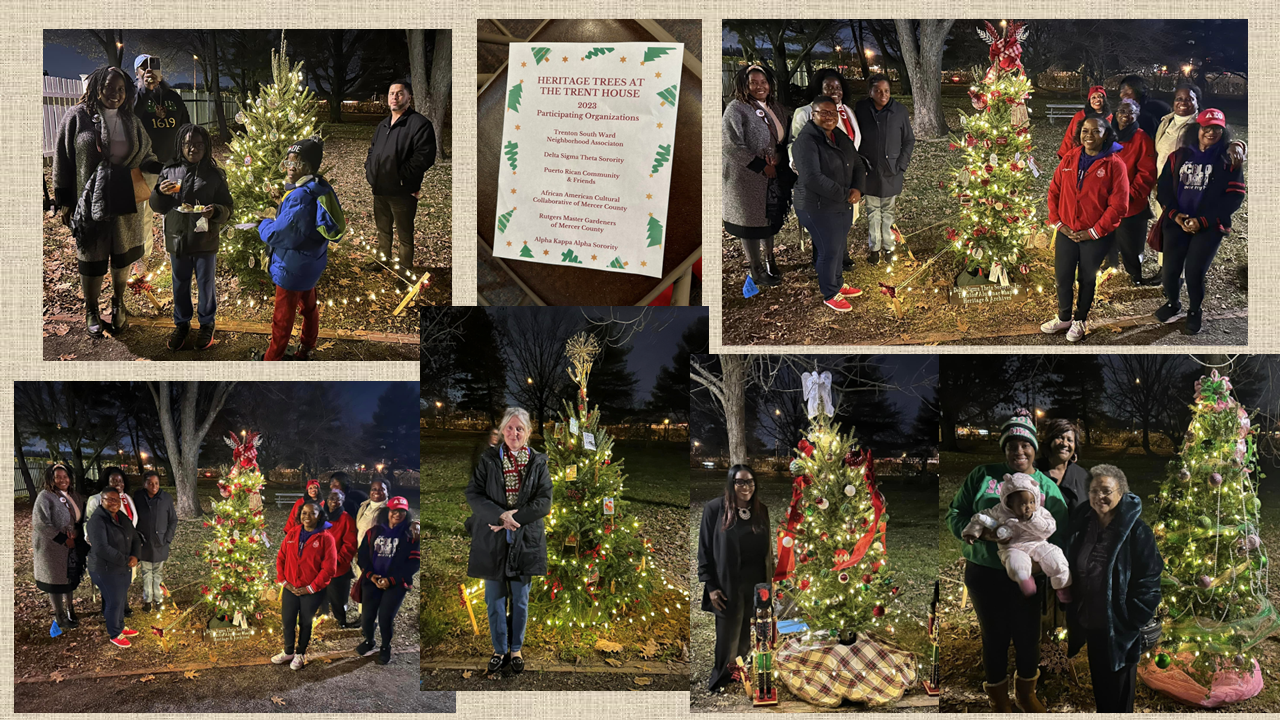
The Trent House Association documents, shares, and celebrates the long history of Trenton and its people. The 2023 Heritage Tree event was an opportunity to recognize and honor several community organizations that contribute so much to our community. This year’s participating organizations were the African American Cultural Collaborative of Mercer County, the Rutgers Master Gardeners of Mercer County, the Trenton Puerto Rican Community & Friends, the Trenton South Ward Neighborhood Association, and the Trenton chapters of the Alpha Kappa Alpha and Delta Sigma Theta Sororities.
Hogmanay - A Scottish Celebration of the New Year
Saturday, December 30, 2023 - 2 pm
Saturday, December 30, 2023 - 2 pm
William Trent immigrated to the American colonies in the late 1600s from his home in the Highlands of Scotland. Hogmanay is the traditional celebration of the new year in Scotland and the William Trent House Museum has commemorated Trent’s Scottish heritage with a Hogmanay program during Trenton’s Patriots Week since 2011.
2023 highlights enjoyed by an audience of about 100 included Scottish music by the Greater Trenton Pipes & Drums, Hogmanay memories of her childhood in Scotland recounted by Marge Caldwell Wilson, storytelling by Denise McCormack, and a spinning demonstration by Jen Lichtmann. The program ended with singing of Auld Lang Syne and wishes for 2024.
2023 highlights enjoyed by an audience of about 100 included Scottish music by the Greater Trenton Pipes & Drums, Hogmanay memories of her childhood in Scotland recounted by Marge Caldwell Wilson, storytelling by Denise McCormack, and a spinning demonstration by Jen Lichtmann. The program ended with singing of Auld Lang Syne and wishes for 2024.
Heritage Trees - A Celebration of Community
Opening Reception - Saturday, December 16, 2023 - 5 to 7 pm
Opening Reception - Saturday, December 16, 2023 - 5 to 7 pm
The Trent House Association documents, shares, and celebrates the long history of Trenton and its people. The 2023 Heritage Tree event is an opportunity to recognize and honor several community organizations that contribute so much to our community. This year’s participating organizations are the African American Cultural Collaborative of Mercer County, the Rutgers Master Gardeners of Mercer County, the Trenton Puerto Rican Community & Friends, the Trenton South Ward Neighborhood Association, and the Trenton chapters of the Alpha Kappa Alpha and Delta Sigma Theta Sororities.
The Life and Times of William Trent of Inverness
Sunday, December 10, 2023 - 1 pm via Zoom
Sunday, December 10, 2023 - 1 pm via Zoom
William Trent (–1677) was a merchant and entrepreneur based in the port of Inverness in the 1600s, coming to prominence during its occupation by Cromwell’s army. He married Issobell Stewart, daughter of a prominent Inverness merchant, in 1662 and they had seven children.
William and Issobell's son, William, moved with two of his brothers to America to set up a trading business in the Philadelphia and New Jersey area. This son William purchased 1,000 acres at the Falls of the Delaware and built his home there in 1719, now the William Trent House Museum.
William and Issobell's son, William, moved with two of his brothers to America to set up a trading business in the Philadelphia and New Jersey area. This son William purchased 1,000 acres at the Falls of the Delaware and built his home there in 1719, now the William Trent House Museum.
|
Dr. Jim Mackay joined us via Zoom from Scotland on Sunday, December 10th, at 1 pm (US Eastern time) to share some of his research on the life and times of Inverness merchant William Trent, the father of Trenton's founder.
For many more details, read Dr. Mackay's extensive paper, "The Life and Times of William Trent, Merchant of Inverness, and his Family including son William Trent, founder of the City of Trenton, Capital of New Jersey, and brother Maurice Trent, Merchant of Leith." |
Greens Sale & Open House
Saturday-Sunday, December 2-3, 2023 - 1 pm to 4:30 pm
Saturday-Sunday, December 2-3, 2023 - 1 pm to 4:30 pm
|
The Trent House Association will held its annual Greens Sale and Open House on Saturday and Sunday, December 2nd and 3rd, from 1 to 4:30 pm each day.
Hot cider and chilled eggnog were served to visitors shopping for wreaths and table arrangements decorated by the talented members of the Garden Club of Trenton. Free tours of the historic 1719 William Trent House were offered and the Trent House Gift Shop was open. . |
Native American Government & Sovereignty - A Video Premiere
Saturday, November 18, 2023 - 1 pm in the Visitor Center
Saturday, November 18, 2023 - 1 pm in the Visitor Center
|
The Trent House Association premiered a video on Native American government and sovereignty with an introduction and background provided by its scriptwriter and narrator Brianna Dagostino.
Produced with funding from the New Jersey Council for the Humanities, this video is the first of a series intended to inform teenagers and adults about the history, culture, and contemporary life of the Lenape people of New Jersey. Brianna Dagostino is a member of New Jersey's state-recognized Nanticoke Lenni-Lenape Tribe. She recently obtained her Master’s Degree in history from Rowan University, submitting “Tribal Rights Are Important Rights”: The Origins, Travails, And Impact Of The Nanticoke Lenni-Lenape Tribe V. The State Of New Jersey as her thesis. Brianna lectures throughout the east coast about her people, instilling appreciation of the Nanticoke Lenape people. |
Halloween Storytelling at the Trent House
Sunday, October 29, 2023 - 3 to 5 pm
Sunday, October 29, 2023 - 3 to 5 pm
|
Master Storyteller Denise McCormack shared Halloween stories in the back parlor of the historic Trent House Museum to audience members ranging from preschool to adult. Following the stories, visitors enjoy apple ciders and seasonal refreshments in the Trent House Visitor Center
Denise McCormack has been a featured teller and workshop presenter at local and regional events, including the National Storytellers Network conferences and Philadelphia stages. Among her affiliated roles are: NJ state liaison for the National Storytelling Network; recent past chair and board member of the NJ Jersey Storytelling Festival; president of Patchwork: A Storytelling Guild in Philadelphia; member of the board of the Lehigh Valley Storytelling Guild; and editor of National Storytelling League's publication "Story Art." |
Authentic History and the Future of Democracy - A Community Conversation
Sunday, October 15, 2023 - 3 to 5 pm At the Trent House Visitor Center
Sunday, October 15, 2023 - 3 to 5 pm At the Trent House Visitor Center
The Trent House hosted its second annual Community Conversation on Democracy, exploring three questions.
Trenton’s First Italian Immigrant Families 1793-1850
Sunday, October 8, 2023 - 2 pm at the Visitor Center & via Zoom
Sunday, October 8, 2023 - 2 pm at the Visitor Center & via Zoom
It is estimated that 10,000 Italians immigrated to the United States between 1793 and 1850 including the first to establish residence in Trenton. One immigrant to Trenton, Giovanni Battiste Sartori (known in America as John Sartori), knew the Trent House well, having married Henriette de Woofin, daughter of Chevalier Marie Basil Gaston de Woofin, who owned the estate between 1792 and 1795. In 1804 Giovanni Sartori age 29 and Henriette de Woofin age 18 married in Trenton and began their marital life at Giovanni’s mansion "Rosy Hill," just south of the Trent House along the Delaware.
From San Juan to Trenton: Stories of Puerto Rican Migration
Sunday, September 24, 2023 - 2 pm via Zoom
Sunday, September 24, 2023 - 2 pm via Zoom
|
In the early part of the 20th century, officials attempted to limit citizenship through the definition of Puerto Rico as a U.S. territory. However, as Puerto Ricans migrated to California, Arizona, New York, and other states on the mainland, they challenged these limitations. Conflicts between migrants seeking work and citizenship on the mainland and employers, government officials, court officers, and labor leader illustrate how the meaning of American citizenship was tested and reshaped. Dr. Robert McGreevey, professor of history at the College of New Jersey, reviewed this history, based on the research for his book.
|
The Trent House Association and the Puerto Rican Community & Friends Organization co-sponsored this talk on Puerto Rican migration in honor of Hispanic Heritage Month. |
Army Meets Town - 3rd Annual Re-enactment of the 1781 Encampment of Continental and French Armies in Trenton
Saturday, August 26, 2023 - 10 am to 4 pm on Trent House grounds
Saturday, August 26, 2023 - 10 am to 4 pm on Trent House grounds
In late August-early September 1781, General Washington's Continental troops and General Rochambeau's French troops converged in Trenton where they prepared to cross the Delaware River. Thousands of soldiers and accompanying civilians with horses and oxen pulling wagons and artillery carriages camped in and around the small town of about 500 residents. The encampment lasted several days as cannon were ferried across the river and people on foot and wagons forded at the Falls of the Delaware.
|
The 3rd annual re-enactment of the encampment included re-enactors of Le Regiment Bourbonnais, a French infantry unit; the African American infantry of the 1st Rhode Island Regiment; and the Continental regiment, Lamb's Artillery.
Also on hand were Douglas Aumack as the town's doctor, David Bosted as the town schoolmaster, and Daniel Lapidow as the town blacksmith. Miriam Morton, interpreter at the Old Barracks, set up a farm stand and Shawn Carney, Trent House Museum Administer, sold children's toys from a peddler's cart. Children completing a "scavenger hunt" booklet by visiting all the re-enactors and interpreters received a gift bag. |
Children's faces are obscured for privacy.
|
|
What made Trenton the best tactical site for crossing the Delaware? What logistical challenges needed to be considered and overcome?
Dr. Robert Selig, historian of the Washington-Rochambeau campaign, gave informal talks on how this major military operation was planned and executed. Dr. Selig is a specialist on the role of French forces under the comte de Rochambeau during the American Revolutionary War and serves as project historian to the National Park Service for the Washington-Rochambeau Revolutionary Route National Historic Trail. Paul Larson also spoke on "Mapping the March through Mercer County." The Trent House is proud to be a site officially recognized by the National Park Service on the Washington-Rochambeau Revolutionary Route National Historic Trail. |
Trenton Eyewitnesses to Revolution
Sunday, August 13, 2023 - 2 pm in the Trent House Visitor Center
Sunday, August 13, 2023 - 2 pm in the Trent House Visitor Center
|
Dr. William Bryant and Abraham Hunt were both residents of Trenton during the American Revolution. Bryant had been a surgeon in the British Army and received a half-pay pension after he retired and purchased “Kingsbury” (now known as the Trent House). Abraham Hunt was a merchant and active in civic affairs in Trenton before the Revolution and supplied the Continental Army during the War.
|
Both men have been suspected of Loyalist leanings during war, although neither suffered any major hardship from either British or Patriot forces. The lives of these two men are profiled at https://revolutionarynj.org/rev-neighbors/ and these stylized portraits by Joe Barsin appear there.
Larry Kidder described the continuum of affiliation between Loyalist and Patriot during the Revolutionary War and spoke about these two men and other Revolutionary War-era Trenton residents, revealing the complexities of life in Trenton during the long, hard years of the Revolution and how people from all walks of life coped with war on their doorstep.
Larry Kidder described the continuum of affiliation between Loyalist and Patriot during the Revolutionary War and spoke about these two men and other Revolutionary War-era Trenton residents, revealing the complexities of life in Trenton during the long, hard years of the Revolution and how people from all walks of life coped with war on their doorstep.
Runaway Ads - What Can They Tell Us about Slavery
and the People Who Took Their Freedom?
Sunday, July 16, 2023 - 2 pm in the Trent House Visitor Center
and the People Who Took Their Freedom?
Sunday, July 16, 2023 - 2 pm in the Trent House Visitor Center
|
Many enslaved people took their freedom by running away. Seeking what they considered their valuable property, enslavers took out newspaper advertisements with promised rewards for capture and return of runaways. In addition to revealing much about the practice of enslavement, these documents often provide information about the escaping person that is not recorded elsewhere. What can they tell us about slavery as an institution? How can they be used to help illuminate the humanity of those seeking freedom?
Shawn Carney, Trent House Museum Administrator, and Michael Daubert, recent graduate from the College of New Jersey, described their work exploring these questions with examples of advertisements for people seeking freedom from their enslavement. |
Italians in Colonial America and the Founding of the United States
Sunday, July 9, 2023 - 2 pm in the Trent House Visitor Center
Sunday, July 9, 2023 - 2 pm in the Trent House Visitor Center

Many Italians came to the United States during the late 1800s and early 1900s, but they were not the first Italian immigrants to America. Those who came in the colonial period, while not large in numbers, played an important role in the development of what became a new nation.
The Declaration of Independence contains the most powerful and revolutionary proposition in American political history that, “all men are created equal.” However, before the Declaration was approved by the Continental Congress, a version was submitted for review to an Italian immigrant, whose earlier writings in the Virginia Gazette were paraphrased in Jefferson’s draft.
Who was this man? Who were his compatriots who immigrated to the North American colonies? What was their role in the development of the colonies and their pursuit of freedom?
Thomas Frascella addressed these questions and more about Italians who came to America between 1600 and 1793 and their role in forming the United States.
The Declaration of Independence contains the most powerful and revolutionary proposition in American political history that, “all men are created equal.” However, before the Declaration was approved by the Continental Congress, a version was submitted for review to an Italian immigrant, whose earlier writings in the Virginia Gazette were paraphrased in Jefferson’s draft.
Who was this man? Who were his compatriots who immigrated to the North American colonies? What was their role in the development of the colonies and their pursuit of freedom?
Thomas Frascella addressed these questions and more about Italians who came to America between 1600 and 1793 and their role in forming the United States.
African Ancestry Experience
Sunday, June 11, 2023 - 3 pm in the Trent House Visitor Center
Sunday, June 11, 2023 - 3 pm in the Trent House Visitor Center
|
Connecting with our own family heritage gives life to history. For many African Americans finding those connections is often challenging and may seem impossible.
DNA analysis is opening new avenues to learn about those connections for people of all backgrounds, and DNA data collected across the continent of Africa can reveal family links to tribal groups, kingdoms, and nations. Co-sponsored by the Dr. Carter G. Woodson Greater Trenton chapter of the Association for the Study of African American Life and History and the Trent House Association, the program emphasized the importance for African American families of learning their connections with Africa and with their family history in America. Greater Trenton ASALH chapter president Gerald Truehart described the African Ancestry DNA analysis program. Dr. Princess Hoagland, immediate past president of the Trent House Association spoke about what her family learned about their ancestral roots in Africa and the importance of those revelations. Beverly Mills and Elaine Buck, co-founders of the Stoutsburg Sourland African American Museum, discussed their research on the African American families who have lived in Central New Jersey for many generations, as documented in their two books. |
Ice Cream Social - Celebrating the Trent House's Birthday
Sunday, June 4, 2023 - 1 to 3 pm at the Trent House
Sunday, June 4, 2023 - 1 to 3 pm at the Trent House
|
While restoration of the William Trent House was completed in 1936, it wasn’t until 1939 that it officially opened as a museum with furnishings based on what Trent would have had in his home in the early 1700s. The Trent House Association began holding an ice cream social as a community birthday party for the Museum in 2014 at the 75th anniversary of its opening. After a hiatus of two years, the Association revived this annual tradition welcomed returning and new participants. |
From Sheep to Shawl - Talk & Demonstration
Saturday, June 3, 2023 - 2 pm at the Trent House Visitor Center
Saturday, June 3, 2023 - 2 pm at the Trent House Visitor Center
|
Jen Lichtmann, fiber artist, presented on the craft of converting fleece and fibers into beautiful garments and fun toys, with details on each step in the process. She demonstrated spinning, displayed some products made from her own handspun yarn, and showed samples of her hand-spun yarn, some of which will be available for purchase.
Jen will also described the process and purpose of “fulling,” helping us understand what went on in the fulling mill that Trent established here in the 1700s. |
Our Neighbors - 1880 to 1950: Tracing a Neighborhood's History - Census Forms, Maps, and Tax Records
Sunday, May 21, 2023 at 2 pm in the Trent House Visitor Center
Sunday, May 21, 2023 at 2 pm in the Trent House Visitor Center
Like Trenton today, Trenton in the late 19th century through the first half of the 20th was a destination for newcomers seeking jobs and a better life. During those decades, the Trent House was surrounded by factories and the homes of working-class Trentonians. Early residents in the neighborhood were from England, Ireland, and Germany. By the turn of the 20th century, Jewish immigrants from Russia occupied most of the homes. In the 1930s through 1950s many residents were African Americans moving to Trenton from the South. Hannah Lee, graduate student in public history at Rutgers University-Camden, described how she used multiple sources to trace the neighborhood’s changing population and highlighted some of the fascinating personal histories of residents from each era.
An exhibit of posters of Hannah's work is on display in the Trent House Visitor and can be seen free of charge during regular hours - Wednesday through Sunday, 1:00 to 4:30 pm.
An exhibit of posters of Hannah's work is on display in the Trent House Visitor and can be seen free of charge during regular hours - Wednesday through Sunday, 1:00 to 4:30 pm.
Stories from Trenton’s Past – Immigrant Workers at Roebling Factories
Exhibit Opening & Talk
Sunday, March 26, 2023 at 2 pm at the Trent House Visitor Center
Exhibit Opening & Talk
Sunday, March 26, 2023 at 2 pm at the Trent House Visitor Center
|
The Trent House Association opened a new exhibit on Sunday, March 26, 2023, on immigrants who worked in Trenton’s Roebling factories during the first half of the 20th century.
Like Trenton today, Trenton in the early and middle decades of the 20th century was the destination for immigrants seeking jobs and a better life. The John A. Roebling’s Sons Company employed many immigrants from Eastern and Southern Europe in their factories. The discovery of boxes of worker records opened a window on their lives. Dana Laissle and Rachel Lee, students from the College of New Jersey, presented their research exploring why the nationality of immigrant workers was recorded as hyphenated American - such as Italian-American - in some cases but not in others. The lives of two workers born in Italy were illustrated and examples of how the Roebling records can be used in classrooms to make the history of immigration to the United States come alive were shared. |
Whispers of Freedom Just Between Us - A Trent House Story
Video premiere Sunday, March 12, 2023 at 2 pm at the Trent House Visitor Center
Video premiere Sunday, March 12, 2023 at 2 pm at the Trent House Visitor Center
|
Joan and Nanny were two of the people of African descent enslaved by William Trent. We believe that they both worked in the Trent home - Joan as cook and Nanny as caregiver for the Trent's young son William and maid to Mary Coddington Trent.
After Trent died unexpectedly on Christmas Day 1724, Joan and Nanny faced uncertainty about their futures. This video portrays what they might have been thinking and planning during the extended period between Trent's death and the final settlement of his estate in 1728. |
Removing Barriers to Civic Engagement for African Americans
Sunday, February 5, 2023, at 2 pm via Zoom
Sunday, February 5, 2023, at 2 pm via Zoom

Taking part in community decision-making through voting and other political activities is an important responsibility and privilege of American citizens. But some are denied this opportunity for civic engagement, have been discouraged from exercising their rights, or are alienated from political life as a force for positive change. Dr. Princess Hoagland, immediate past president of the Trent House Association and recipient of a doctorate from Stockton University, presented a virtual talk, “Removing Barriers to Civic Engagement for African Americans,” on Sunday, February 5, 2023 at 2 pm via Zoom.
Dr. Hoagland offered examples from the in-depth interviews she conducted with African American residents of Trenton of the barriers to their engagement in civic and political life. Drawing on her experience as a community activist and her in-depth study, she identified both root causes of these barriers and strategies to overcome them.
Hogmanay! - Celebrating the Scottish New Year
Saturday, December 31, 2022 - 2 to 3 pm
Saturday, December 31, 2022 - 2 to 3 pm
|
William Trent, founder of Trenton, immigrated from Scotland as a young man to Philadelphia where he become a wealthy shipping merchant.
The Trent House commemorates his Scottish heritage with a program with Hogmanay traditions from his homeland. Bagpipers and drummers from the Greater Trenton Pipes and Drums played throughout the program. Trenton Councilwoman Marge Caldwell Wilson shared her memories of Hogmanay celebrations during her childhood in Scotland. Storyteller Denise McCormack recounted a Scottish tale of a king, a maiden, and a wild wood. There were holiday treats, hot cider, and cold eggnog for all and free tours of the historic house. Participants ended the program by placing cards with wishes for the new year in the fire pits in the courtyard. |
Dr. Carter G. Woodson's Birthday Commemoration & Community Conversation
Sunday, December 18, 2022 - 2 to 4 pm
Sunday, December 18, 2022 - 2 to 4 pm
Wreath Sale and Open House
Saturday, December 3, 2022 - 10 am to 5 pm & Sunday, December 4, 2022 - 1 pm to 4 pm
Saturday, December 3, 2022 - 10 am to 5 pm & Sunday, December 4, 2022 - 1 pm to 4 pm
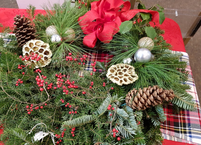
Returning after two years, the Trent House Association in partnership with the Garden Club of Trenton held its annual Greens Sale of wreaths on the first weekend of December. Free tours of the William Trent House Museum were offered along with seasonal treats, hot cider, and chilled eggnog.
Quakers and the American Revolution: Fallsington Friends Take to Arms, 1775
Sunday, September 18, 2022 at 2 pm
At the Trent House Visitor Center and via Zoom
Sunday, September 18, 2022 at 2 pm
At the Trent House Visitor Center and via Zoom
The village of Fallsington, across the Delaware River from Trenton, is one of the earliest settlements in Pennsylvania. In 1682, William Penn arrived in the colonies to set up a “Holy Experiment” in liberty, peace, and equality and established his country home at Pennsbury, three miles from Fallsington. In 1683 settlers in the area met near the falls to establish a monthly Society of Friends meeting for worship, which Penn attended when he was in the colonies. The community grew with mills, ferries, and wharves and the first meeting house was replaced in 1728 with a larger one that still stands today. By the 1770s support for independence from British rule was growing and soon revolution was on the doorsteps of this Quaker community.
|
Kimberly Praria, executive director of Historic Fallsington, Inc., rounded out the Trent House Museum’s Summer of Revolution program series with an exploration of how Quaker men living in the village of Fallsington responded to the call for war against the British.
Contrary to Quaker principles, some men of the village joined the Continental Army during the Revolution. During her talk, Ms. Praria considered such questions as what compelled these men to go against their faith and fight in a war, and were they alone or did other Philadelphia area Friends take to arms as well. |
Washington's and Rochambeau's Armies on the March to Yorktown: Encampment at Trenton, 1781, A Re-enactment
Saturday, August 27, 2022 - 10 am to 5 pm
On the grounds of the 1719 William Trent House Museum
Saturday, August 27, 2022 - 10 am to 5 pm
On the grounds of the 1719 William Trent House Museum
The Trent House with its partners - Trenton City Museum at Ellarslie, Lawrence Historical Society, and the Washington-Rochambeau Revolutionary Route Association-New Jersey - hosted the second re-enactment of the late August/early September 1781encampment in Trenton. Thousands of soldiers of the Continental army under General Washington and the French army under General Rochambeau and the men, women, and children who supported them camped in Trenton half-way through their almost-700 mile march to Virginia. Crossing the Delaware River, the combined forces continued to Yorktown, where the Americans and their French allies defeated British General Cornwallis, ending the War for Independence.
|
Le Regiment Bourbonnais, a French infantry unit, set up a military camp on the grounds, showed visitors how ordinary soldiers lived while not on the battlefield, demonstrated camp cooking, taught children how to drill with French commands, and encouraged children and adults to try on articles of their uniforms for photos and to try their luck in dice and card games.
|
The 1st Rhode Island Regiment, known as the "Black Regiment" for its African American soldiers, regaled visitors with their stories of courage on the battlefield.
Noah Lewis portrayed another Black soldier in the Continental forces, Ned Hector, and described his experiences as a teamster hauling supplies and armaments and as a bombardier who assembled ammunition and placed it in cannon for firing. |
|
Douglas Aumack portrayed an army surgeon and described the challenges in treating injuries and disease in an era when the understanding of germs was in its infancy. He displayed and demonstrated surgical tools of the day. Children participated in a "scavenger hunt" finding the answers to questions as they visited each of the re-enactors. Books were given as prizes. |
|
Throughout the day, Dr. Robert Selig, Historian for the National Washington-Rochambeau Revolutionary Route Association, gave informal talks, highlighting the historical record of the encampment in Trenton.
Visitors studied maps that the French military cartographer Louis-Alexandre Berthier made during the march through Mercer County and compared the roads and terrain of that time with those of today. |
|
We were honored by the presence of a number of elected officials - Trenton Mayor Reed Gusciora, Mercer County Commissioner Samuel Frisby, Assemblyman Anthony Verrelli, and Assemblywoman Verlina Reynolds Jackson. Commissioner Frisby recognized Morven Museum and Garden as the Mercer County Washington-Rochambeau Revolutionary Route Historic Site for 2022 and presented the certificate to Jill Barry, Executive Director, and Liza Morehouse, Chair of the Board. Princess Hoagland, immediate past president of the Trent House Association, read a proclamation for Morven from Mercer County Executive Brian Hughes. |
The Good Americans: His Majesty's Loyal American Troops, 1775-1784
Sunday, August 7, 2022 at 2 pm
In-person at the 1719 William Trent House Museum & via Zoom
Sunday, August 7, 2022 at 2 pm
In-person at the 1719 William Trent House Museum & via Zoom
|
Lieutenant General James Robertson, one of Britain’s most senior generals in America and the last royal governor of New York, famously stated it was always his intention to subdue the bad Americans with the “Good Americans.” Who was he speaking of? During the period of the war, perhaps some 50,000 Americans, both black and white, served King George in a variety of roles, often shoulder to shoulder with His Majesty’s Regulars.
Todd Braisted, past president of the Bergen County Historical Society, has authored numerous articles and books on the American Revolution, with a particular focus on Loyalists. His website www.royalprovincial.com is a leading source for Loyalist studies. His presentation was a guide to understand the roles and makeups of those American corps in British pay: the establishments, personnel, logistics. raising, disciplining, and history of those who served then, and who are portrayed today, on the battlefields of America. |
Governor Morris' 1742 Kitchen & Other Findings from Archaeology at the Trent House
Sunday, July 24, 2022, at 2 pm
In-person at the 1719 William Trent House Museum & via Zoom
Sunday, July 24, 2022, at 2 pm
In-person at the 1719 William Trent House Museum & via Zoom
|
In 1742, when he was appointed Governor of the colony of New Jersey, Lewis Morris was looking to lease suitable housing in Trenton. Then owned by the Governor of Pennsylvania, the Trent House - then known as Kingsbury - was his choice with one condition: that a separate kitchen building be constructed for use in place of the kitchen in the basement of the house and that it be large enough to accommodate his enslaved servants. This illustration shows the two-story brick building that was built with a breezeway connecting it to the main house.
|
|
While the existence of the kitchen building has long been known, no trace of it remains above ground. In 2014 Hunter Research was commissioned by the Trent House Association, with funding from NJM Insurance Group, to conduct a preliminary excavation, which successfully uncovered evidence of the building's foundation. Since then, with continued support from NJM and additional funding from the New Jersey Historic Trust, additional structures and artifacts have been discovered. Richard Hunter and Jim Lee of Hunter Research and Dr. Richard Veit of Monmouth University brought the findings together and discussed ways that this historic treasure can inform our understanding of the lives of all those living and working on the plantation at the Falls of the Delaware in the 18th century. |
"The Price of Silence: The Forgotten Story of New Jersey's Enslaved People" - Making the Documentary
Tuesday, July 19, 2022, at 6:30 pm via Zoom
Tuesday, July 19, 2022, at 6:30 pm via Zoom
|
With Part 1 aired in June 2022 and Part 2 expected in August, this documentary was produced by Truehart Productions, headed by Ridgeley Hutchinson. Truehart Productions is a nonprofit corporation formed in 2019 for the sole purpose of producing a documentary during this critical time when so many are struggling to understand the racial disparities that exist in our country. The film reveals the prevalence of slavery during the 17th, 18th, and 19th centuries and its lasting effects throughout New Jersey during the 20th century. Mr. Hutchinson described the story behind the documentary with illustrations from the filming.
|
The First Historian of the Battle of Trenton: Francois-Jean de Chastellux, 1734-1788
Saturday, July 9, 2022 - 2 pm
In-person at the 1719 William Trent House Museum & via Zoom
Saturday, July 9, 2022 - 2 pm
In-person at the 1719 William Trent House Museum & via Zoom
|
During the last phase of the American Revolution, the French expeditionary army of the Count de Rochambeau came to the aid of George Washington's forces in 1780. To conduct war in these new, unknown lands, a group of French officers went on a mission to do extensive studies of the American lands and the former battlefields of the American Revolution. François-Jean de Chastellux, the Major General of Rochambeau's army, studied these former battlefields extensively, with the approach of a true historian.
Dr. Iris de Rode specializes in the French role in the American Revolution and has completed a biography on the Marquis de Chastellux, based on his unpublished private papers that she discovered in the Château de Chastellux. |
Jewish Life in Trenton - Trent House Neighbors in Late 19th & Early 20th Centuries
Sunday, June 12, 2022 at 2 pm
In-person at the 1719 William Trent House Museum & via Zoom
Sunday, June 12, 2022 at 2 pm
In-person at the 1719 William Trent House Museum & via Zoom
|
While doing archival research for the society, Arthur Finkle, whose roots in Trenton reach back three generations, realized there was no fully documented work on the city’s Jewish history — so he wrote one. The book that grew out of his studies, Trenton’s Jews: Beginning, Adaptation and Achieving the American Dream, was published in 2016 by Hadassa Word Press. Mr. Finkle, chair of the Trenton Jewish Historical Society, described the history of the Russian Jewish community in the Trent House neighborhood in the late 1800s and early 1900s. |
Major William Trent, Revolution, and the Lower Ferry
Sunday, June 5, 2022 - 2 pm
In-person at the 1719 William Trent House Museum & via Zoom
Sunday, June 5, 2022 - 2 pm
In-person at the 1719 William Trent House Museum & via Zoom
|
William Trent, the Philadelphia merchant who bought 1,000 acres at the Falls of the Delaware in 1714 and established Trent’s Town there, had a son who was his namesake. The younger William Trent was commissioned by the Lieutenant Governor of Virginia to establish a fort at the Forks of the Ohio, near present-day Pittsburgh, to defend British interests. After the War in 1769 he sailed to England to petition for recompense for funds expended in that cause. Upon returning in the summer of 1775, he learned of fighting in Massachusetts and the colonies in an uproar. With the Revolutionary War looming closer to New Jersey, Trent would propose a new colony, operate a ferry business and plantation in south Trenton, and finally make the decision between King and country.
|
Jason Cherry described the role that William Trent’s son and the Lower Ferry played in the Revolutionary War, drawing on his continuing research into the life and times of the younger Trent. A native of Butler, Pennsylvania and 2002 graduate of the University of Massachusetts, Jason Cherry has participated for more than 30 years in re-enactments of the group of volunteers hired under William Trent, Jr. in 1754, a unit known as Captain William Trent's Company. His book, Pittsburgh’s Lost Outpost: Captain Trent’s Fort, was published in 2019 and he is working on a complete biography of the younger William Trent.
A Home and Military Headquarters -
General Washington’s Stay at the Dey Mansion, 1780
Thursday, May 12, 2022 - 7 pm via Zoom
General Washington’s Stay at the Dey Mansion, 1780
Thursday, May 12, 2022 - 7 pm via Zoom
|
The Dey Mansion, built ca. 1770, was the home to Theunis and Hester Dey and was called “Bloomsbury,” the same name given by Colonel John Cox to his home in Trenton, the Trent House. During the American Revolution, Theunis Dey served as colonel of the Bergen County Militia, which brought him into constant communication with Washington. The Dey home served as General George Washington’s headquarters during July, October, and November of 1780. This site was chosen because of its strategic position and accessibility to food and forage. Kelly McManus, museum specialist with the Passaic County Department of Cultural and Historic Affairs, described what it must have been like to have a military command post set up in one’s home and how feeding and housing troops during wartime must have affected the local community. Kelly McManus is adjunct professor of history at William Paterson University and holds a Bachelor of Art’s degree in history from Kutztown University of Pennsylvania and a Master’s degree in history from William Paterson University. After interning with the Department of Cultural and Historic Affairs, he joined the visitor services staff at the Dey Mansion in 2018. |
The History of Greater Mount Zion AME Church – The Oldest Black Church in Trenton
Thursday, May 5, 2022 - 7 pm via Zoom
Thursday, May 5, 2022 - 7 pm via Zoom
|
Greater Mount Zion AME Church, located on Pennington Avenue in Trenton, is the oldest Black congregation in Trenton, being first incorporated as “The Religious Society of Free Africans of Trenton” in 1811. Richard Allen, founder of the American Methodist Episcopal denomination, helped organize the Society into one of its first churches in 1816.
Since then Mount Zion, now Greater Mount Zion, AME Church has been a vital force in Trenton’s history. Over the past 200+ years the Church has built and rebuilt its worship space and, among other firsts, founded the first nursery school in Trenton for Black children and became the first church to establish a credit union. Rev. Dr. Charles F. Boyer, senior pastor for Greater Mount Zion AME Church, discussed the history and current mission of this historic congregation. Rev. Boyer is a third-generation AME preacher and is founder and executive director of Salvation and Social Justice, a non-partisan organization that is a leading Black faith-rooted advocate for racial justice and the eradication of mass incarceration. |
Patriot or Loyalist? The Case of Dr. William Bryant
Wednesday April 20, 2022 - 7pm via Zoom
Wednesday April 20, 2022 - 7pm via Zoom
|
Dr. William Bryant, who owned and lived in today’s Trent House from 1769 to 1778, is usually identified as a Loyalist. But was he? His story, and the stories of people he knew in Trenton, tell us much about how people in Trenton grappled with difficult decisions about which side to support in the American Revolution and how public and vigorous their support would be.
This talk by William (Larry) Kidder explored Dr. Bryant’s life and examine the evidence often cited about his political stance. Researching Dr. Bryant’s story illustrates how a “fact” sometimes requires reconsideration and how historians act as “detectives,” sorting through partial and often conflicting evidence to shed new light on a mystery. |
Larry Kidder is well-known as an historian of the Revolutionary War and frequent speaker on the subject. His books include A People Harassed and Exhausted: The Story of a New Jersey Militia Regiment in the American Revolution, Crossroads of the Revolution: Trenton 1774-1783, Revolutionary Princeton 1774-1783: The Biography of an American Town in the Heart of a Civil War, and most recently, The Revolutionary World of a Free Black Man: Jacob Francis 1754-1836.
Telling Women’s Stories Across Four Generations
Wednesday, March 23, 2022, 7pm via Zoom
Wednesday, March 23, 2022, 7pm via Zoom
|
Often the stories of women have been omitted from historical narratives, even at historic houses and sites. Learning about and presenting the roles women from all positions in society have played is essential to understanding our state’s and our nation’s history. Tessa Payer of Passaic County’s Department of Cultural and Historic Affairs discussed an example of how to integrate women’s experiences and perspectives into that history at the Van Riper-Hopper House in Wayne, NJ. Built circa 1786, the Van Riper-Hopper House was home to four generations of the Van Riper family and those who served them.
|
Ms. Payer described what has been learned about the lives of the wives, sisters, daughters, enslaved women, and paid domestic servants who occupied the House in the early years of our republic based on her extensive research. She provided listeners with a practical path for researching women’s history, describing available sources and databases.
"Respect:" Signifying through Song
Saturday, March 19, 2022, 1 pm via Zoom
Saturday, March 19, 2022, 1 pm via Zoom
|
African Americans have been at the forefront among women using popular music to promote personal dignity and social equality. Whether in soul, jazz, rhythm and blues, and other song forms, women like Aretha Franklin, Bernice Johnson Reagon of Sweet Honey in the Rock, and Trenton’s own Sarah Dash lent their voices for women’s empowerment. Dr. Linda Caldwell Epps, historian and CEO of 1804 Consultants, recounted the lives and contributions of some of these strong voices. Ms. Danielle Miller-Winrow shared how her aunt, Sarah Dash, used her talents to inspire women to soar.
The Trent House Association dedicated this presentation to the memory of Sarah Dash, who died in September 2021. Ms. Dash was a Trenton native who had a long and illustrious career in a wide range of musical forms including soul, disco, rock, and jazz. The program was the first of a collaborative series among Trenton’s cultural institutions honoring Ms. Dash. |
Celebrating Four Centuries of African American Soldiers
Saturday (in-person) and Sunday (virtual), February 26 and 27, 2022, in the Museum
Saturday (in-person) and Sunday (virtual), February 26 and 27, 2022, in the Museum
|
In 2021 the 6th Regiment U.S. Colored Troops Re-enactors of Trenton filmed its members at the Trent House, portraying African American soldiers who served their country in war, from the Revolutionary War to World War II. On Saturday, February 26, 2022, many of the same re-enactors re-told their stories to visitors to the House. And on Sunday, February 27th, visitors were able to see displays of uniforms and equipment and watch segments of the video.
|
Timbuctoo and the First Emancipation of the Early 19th Century
Wednesday, February 9, 2022, 7 pm via Zoom
Wednesday, February 9, 2022, 7 pm via Zoom
|
Previously unpublished details about the lives of antebellum free Black people in southern New Jersey were presented in this discussion about Timbuctoo, a community of formerly enslaved and free Black people in Burlington County. Settled in 1826, this community included at least two churches, a cemetery, two schools, and a benevolent organization. Guy Weston, the descendant of an early home owner in Timbuctoo, has researched the community for many years and described its rich history. During his talk he identified the documents and archives available to uncover both personal family stories and community. These sources give life to the historical record with first-hand accounts of people and events of the time.
Guy Weston, M.A., currently serves as managing director of the Timbuctoo Historical Society and is a visiting scholar in the history department at Rutgers University (New Brunswick). He is active in the Association for the Study of African American Life and History (ASALH) and the Afro-American Historical and Genealogical Society (AAHGS). His article on Timbuctoo was published in New Jersey Studies at https://njs.libraries.rutgers.edu/index.php/njs. |
Ties That Bind: Nanticoke and Lenape Language and Revitalization
Sunday, January 23, 2022, 2 pm via Zoom
Sunday, January 23, 2022, 2 pm via Zoom
The land on which the Trent House was built is part of the traditional territory of the Lenape, called “Lenapehoking.” During the colonial era and early federal period, many were removed west and north, but some remained among the three continuing historical tribal communities of the region. Today, Lenapehoking is a diaspora of different communities across the United States and Canada, connected by history, culture, and language.
For Lenape and Nanticoke people, revitalizing their languages is a way to reconnect with ancestors and to reclaim traditional ways of understanding the world that are embedded in language. Karelle Hall, a member of the Nanticoke Indian Tribe and a graduate student in anthropology at Rutgers University, traced the connections across the Lenape and Nanticoke diaspora and illustrated how language both shapes and reinforces those connections.
For Lenape and Nanticoke people, revitalizing their languages is a way to reconnect with ancestors and to reclaim traditional ways of understanding the world that are embedded in language. Karelle Hall, a member of the Nanticoke Indian Tribe and a graduate student in anthropology at Rutgers University, traced the connections across the Lenape and Nanticoke diaspora and illustrated how language both shapes and reinforces those connections.
The West Airport Road Project - Memorializing the Contributions of Migrant and Resident African Americans to the Development of Central New Jersey
Sunday, November 7, 2021 - 2 pm
In-person and via Zoom
Sunday, November 7, 2021 - 2 pm
In-person and via Zoom
The West Airport Road Project began with the rediscovery of a 1997 newspaper article on George Sumbry, an African American veteran of World War II who returned to the Hightstown-East Windsor area and established a grocery store on Airport Road. Mr. Sumbry knew the area from his teenage years when he and his brother found work there after leaving Alabama in 1929. His is the story of many other African Americans who left the South and found work in the North during the Great Migration.
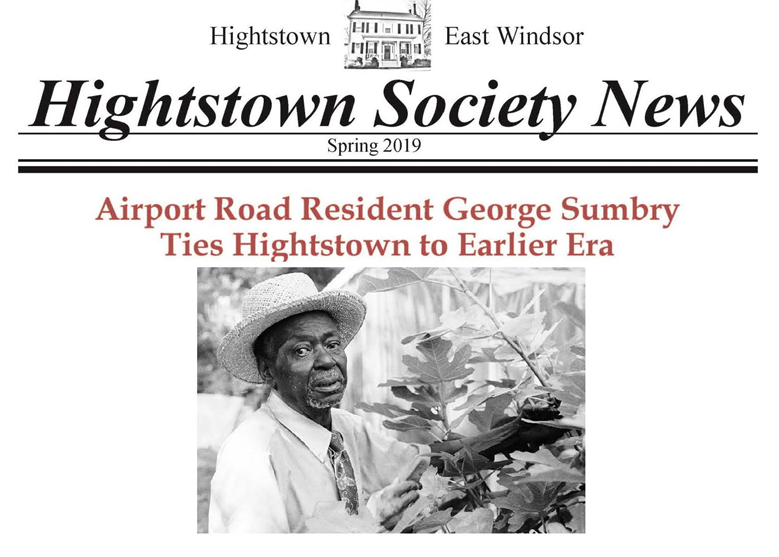
The West Airport Road Project will commemorate contributions to agriculture and commerce in the Hightstown-East Windsor area by the Sumbry family and others who worked and lived there. In his talk Mr. Charles (Cappy) Stults, president of the Hightstown-East Windsor Historical Society, outlined that history and describe plans to erect interpretive signs along the road where African Americans first lived, built churches, and established businesses.
The Trent House Association in partnership with the Hightstown-East Windsor Historical Society presented the talk on the West Airport Road Project both in-person at the Trent House Museum Visitor Center and virtually on Zoom.
African Ancestry: Trace Your DNA, Find Your Roots
Sunday, October 24, 2021 - 4:00 pm
Sunday, October 24, 2021 - 4:00 pm
|
In partnership with the Greater Trenton branch of the Association for the Study of African American Life and History (ASALH), the Trent House Association sponsored an information session on African Ancestry, a DNA test that can trace an individual's maternal family line by country and ethnic group for 2,000 years. This free information session was offered in-person and via Zoom.
|
The Chilocco History Project: A Century of Stories from a Federal Native American Boarding School
Saturday, October 23, 2021 - 4 pm
Saturday, October 23, 2021 - 4 pm
Chilocco Indian Agricultural School is located in north central Oklahoma and operated from 1884 -1980 as one of a handful of federal off-reservation Indian boarding schools in the United States. Thousands of students passed through the school's iconic entryway arch during its nearly century-long existence. Even today, Chilocco continues to be a powerful site for memory for its remaining alumni from over 127 tribes, Native peoples directly or indirectly impacted by its history, and scholars and students throughout the world who seek to understand its role within the larger context of U.S. Indian boarding schools.
|
Dr. Julie Pearson-Little Thunder, Dr. Lisa Lynn Brooks, and Sarah Milligan shared their experience working on the Chilocco History Project a three-year collaborative agreement between the Oklahoma Oral History Research Program (OOHRP) at Oklahoma State University in conjunction with the Chilocco National Alumni Association (CNAA), an organization made up of former students and staff of Chilocco Indian Agricultural School, which hosts annual reunion which has taken place since 1894.
|
The presenters discussed the development of the history project, which documented over 40 oral history interviews with living alumni and staff, shared thousands of images digitized from the CNAA archives, developed a documentary, and supported the development of K-12 curriculum to bring these archives into the classroom, which can be found online: https://chilocco.library.okstate.edu
Celebrating the 240th Anniversary of the March to Yorktown and the Encampment of Washington's and Rochambeau's Armies in Trenton
Saturday, August 28, 2021 - 10 am to 5 pm on-site
Saturday, August 28, 2021 - 10 am to 5 pm on-site
Just as it was in 1781, the Trent House grounds hosted American and French infantry and artillery soldiers. Re-enactors demonstrated how soldiers in the Continental Army under General Washington and America's French allies under General Rochambeau lived during the 680-mile march from New England to Yorktown, Virginia, and how they prepared for the decisive battle that ended the Revolutionary War.
It was at the end of August 1781 that the two armies first converged in Princeton. They then proceeded down the King’s Highway, now New Jersey Route 206, to encampment at Trenton, New Jersey before crossing the Delaware River. French cannons were parked on the estate known as Bloomsbury and owned by Assistant Quartermaster General of the Continental Army, Colonel John Cox. In the early 1700s this estate had been the home of William Trent, for whom Trenton is named. The final major battle of the Revolutionary War took place in October 1781 when the combined forces of the Continental Army and its French allies finally captured British General Cornwallis’ army at Yorktown in Virginia. This victory, after five years of warfare, ensured America’s independence.
It was at the end of August 1781 that the two armies first converged in Princeton. They then proceeded down the King’s Highway, now New Jersey Route 206, to encampment at Trenton, New Jersey before crossing the Delaware River. French cannons were parked on the estate known as Bloomsbury and owned by Assistant Quartermaster General of the Continental Army, Colonel John Cox. In the early 1700s this estate had been the home of William Trent, for whom Trenton is named. The final major battle of the Revolutionary War took place in October 1781 when the combined forces of the Continental Army and its French allies finally captured British General Cornwallis’ army at Yorktown in Virginia. This victory, after five years of warfare, ensured America’s independence.
Two re-enactor organizations – Le Regiment Bourbonnais and Le Regiment Saintonge – represented French infantry and artillery. Also participating were re-enactors of African American infantrymen of the 1st Rhode Island Regiment and John Lamb’s Artillery Company. Interpreters from the Old Barracks were also be on-site. The William Trent House Museum as a site on the Washington-Rochambeau Revolutionary Route National Heritage Trail was recognized with presentation of a sign by National Park Service Trail Administrator Johnny Carawan.
Remarks were given by Congresswoman Bonnie Watson Coleman, Mayor Reed Gusciora, Director of Trenton Parks, Recreation & Culture Maria Richardson, City Councilwoman Marge Caldwell-Wilson, and Mercer County Executive Brian Hughes. The Congresswoman and the Mayor are shown below with many of the re-enactors.
Remarks were given by Congresswoman Bonnie Watson Coleman, Mayor Reed Gusciora, Director of Trenton Parks, Recreation & Culture Maria Richardson, City Councilwoman Marge Caldwell-Wilson, and Mercer County Executive Brian Hughes. The Congresswoman and the Mayor are shown below with many of the re-enactors.
Co-sponsors of the event included the Trenton City Museum at Ellarslie, the Lawrence Historical Society, and the National Washington Rochambeau Revolutionary Route Association (W3R-US) and its local New Jersey chapter. The event was partially supported by the National Park Service and W3R-US.
Black August - Then and Now: Historical Origins and Current Relevance
Sunday, August 22, 2021 - 4:00 to 5:30 pm via Zoom
Sunday, August 22, 2021 - 4:00 to 5:30 pm via Zoom
|
After the widely televised death of George Floyd, the world was awakened to how wrong encounters with law enforcement can go. During the late sixties and early seventies, similar attention was brought to murderous encounters in the United States prison system. Names like Jonathan and George Jackson, Angela Davis, Attica, Soledad, Counterintelligence Program, and San Quentin Prison captured the attention of activists of the day, leading to a vibrant movement for prison condition reform. Out of that movement came the creation of “Black August.” The “Black August – Then and Now” panel discussion and poetry readings informed our audience about this movement of resistance to oppression and demand for prison/criminal justice reform. The program was jointly hosted by the Trent House Association (THA) and the Greater Trenton Branch of the Association for the Study of African American Life and History (ASALH).
Artwork by Ojure Lutalo, artist and former political prisoner. |
Panelists: Bonnie Kerness, Program Director of the American Friends Service Committee Prison Watch; Pastor Lukata Mjumbe, Witherspoon Street Presbyterian Church, Princeton, NJ. Poets: Nekiel Butler, Raul Cortes Jr. Opening and closing remarks: Gerald Truehart II, President of the Greater Trenton Branch of ASALH. Moderators: Christine Samson-Clark, Secretary of the Trent House Board of Trustees, and Deborah Roussell, Trustee.
Archaeology and Ancient Technology - Celebrating New Jersey's Indigenous People
Saturday, June 26, 2021 - 12 noon to 3 pm
Saturday, June 26, 2021 - 12 noon to 3 pm
|
Visitors met the archaeologists been working on the Museum’s grounds and viewed some of the artifacts left by native people thousands of years ago. Demonstrators exhibited how stone tools, pottery, and wampum were made and used by New Jersey’s first residents. Activities for children gave them hands-on experience in finding and identifying artifacts.
The 2021 archaeology project was supported by a grant from the New Jersey Historic Trust, a generous gift from NJM Insurance Group, and members and donors of the Trent House Association. Event partners included Hunter Research, a Trenton-based archaeology and cultural management firm, the New Jersey State Museum, the Tulpehaking Nature Center, and the Friends for the Abbott Marshlands, where the Center is located. |
Museum Re-opening & Presentation of 1677 Deed of Trenton's First English Colonist
Sunday, June 6, 2021 - 2 to 4 pm
Presentation of deed at 2:30 pm
Sunday, June 6, 2021 - 2 to 4 pm
Presentation of deed at 2:30 pm
|
The Trent House Association in partnership with the City of Trenton announced the re-opening of the 1719 William Trent House Museum with a special welcome-back program, free to all. Visitors were able to view new exhibits in the Museum, Visitor Center, and garden exploring the rich history of the many people whose lives were connected with this historic site. The Trenton Historical Society joined the Association in presenting a deed signed in 1677 by the first English resident of the area, Mahlon Stacy, that was recently purchased by the two organizations. The deed will remain on view at the Trent House through the summer before being donated to the Trenton Free Public Library for its Trentoniana Collection. |
A Taste of History with Chef Walter Staib
Sunday, May 16, 2021 - 2pm
Sunday, May 16, 2021 - 2pm
|
A third-generation restaurateur with over five decades of culinary experience, Chef Walter Staib is an author, Emmy Award winning TV host, James Beard-nominated chef and culinary historian. His career began in Europe, receiving formal training in many of Europe’s finest hotels and restaurants.
As founder of Concepts By Staib, Ltd., a global restaurant management and hospitality consulting firm, Walter Staib has opened more than 650 restaurants worldwide and was the driving force behind Philadelphia’s City Tavern for 26 years. Chef Staib is best known as host of A Taste of History, which has received Fifteen Emmy awards. Staib has also made appearances on national cooking shows, such as 60 Minutes, the Today show and the Food Network’s “Best Thing I Ever Ate” and “Iron Chef.” Chef Staib’s culinary excellence has earned him numerous other awards, including induction into the American Academy of Chef’s Culinary Hall of Fame by the American Culinary Federation. |
"We Are Still Here:" The History and Continuing Culture of New Jersey's Indigenous Tribal Communities
Saturday, April 17, 2021 - 1 pm
Saturday, April 17, 2021 - 1 pm
|
The land on which the Trent House was built is part of the traditional territory of the Lenni- Lenape, called “Lenapehoking.” The Lenni-Lenape People lived in harmony with one another upon this territory for thousands of years before European colonization. During the colonial era and early federal period, many were removed west and north, but some remained among the three continuing historical tribal communities of the region: The Nanticoke Lenni-Lenape Tribal Nation; the Ramapough Lenape Nation; and the Powhatan Renape Nation. The Trent House acknowledges the Lenni-Lenape as the original people of this land and their historic and continuing relationship with their territory.
Rev. Dr. J.R. Norwood, Jr. spoke on the Lenape, the original people who lived in what is now New Jersey, and their contributions to our state’s rich diversity. |
The Rev. Dr. J.R. Norwood, Jr., is an ordained Christian clergyman and founding pastor of the Ujima Village Christian Church of Ewing, New Jersey. A member of the Nanticoke Lenni-Lenape Tribal Nation, he served as an elected Tribal Councilman from 2004 to 2019, is currently the first Principal Justice of the Tribal Supreme Court of the Nation, and represents the Nanticoke Lenni-Lenape in the National Congress of American Indians, where he serves as co-chairman of the Task Force on Federal Acknowledgment.
Passing the Time with Major William Trent - Video Premiere and Talk
Saturday, March 13, 2021 - 1 pm
Saturday, March 13, 2021 - 1 pm
|
The younger William Trent was still a child when his father died suddenly on Christmas Day 1724. After a mercantile apprenticeship in Philadelphia, Trent followed in his father’s footsteps as a man of business, trading with Native Americans for furs. But unlike his father he was also a military man.
Jason Cherry developed the script and portrays Trent in the video, based on his extensive research on the Trent family. As a research consultant to the William Trent House, he also provided much of the information presented in the Museum’s recently released video, “Mary Coddington Trent Reflects – 1726,” about Trent's mother. Jason speaks frequently on the French and Indian War and is working on the complete biography of Major William Trent. |
"Open the Door, I'll Get It Myself:" The Great Migration to New Jersey
Saturday, February 27, 2021 - 1 pm
Saturday, February 27, 2021 - 1 pm
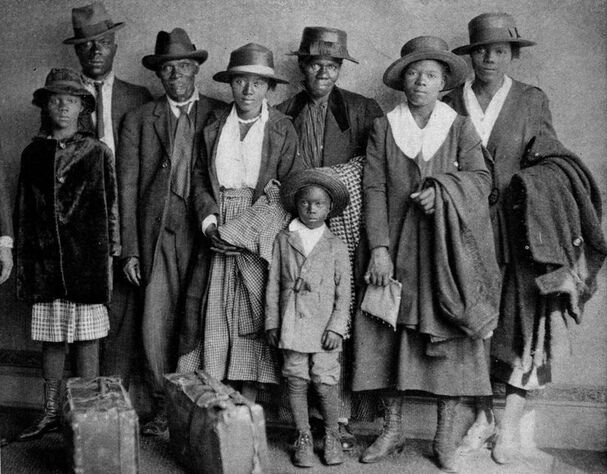
New Jersey's African American population multiplied during what is known as the Great Migration in the early decades of the 20th century. A leading history scholar and acclaimed speaker, Dr. Linda Caldwell Epps explored the factors leading African Americans to take on the challenges and risks of leaving communities and families in the South for an unknown, but hoped for, better future in the North. She shared stories of some of these migrants and discuss how their arrival changed life and culture in New Jersey's cities.
"In Graves of Their Own:" Reclaiming the Locust Hill Cemetery
Saturday, February 6, 2021 - 1 pm
Saturday, February 6, 2021 - 1 pm
|
Algernon Ward, a notable figure in Trenton’s history community and member of the 6th Regiment of the United States Colored Troops Civil War re-enactor organization, will highlight the history of the Locust Hill Cemetery from its beginnings in the 18th century as the earliest known burial place of African Americans in Trenton. He will outline current efforts to ensure the cemetery’s preservation and commemorate the people buried there, including several Civil War veterans.
Mr. Ward and the 6th Regiment are leading that project, which includes developing an interpretive center next to the cemetery. The Locust Hill Cemetery joins other sites important to Trenton’s African American history, including the 1856 Higbee School, the first free school for African Americans in Trenton, and the Carver Youth and Family Center, a social and cultural center for Trenton’s Black community. For a recording of this talk, go to our videos page. |
Immigration and Americanization - Eastern European Workers in Trenton's Roebling Factories
Saturday, January 23, 2021 - 1 pm
Saturday, January 23, 2021 - 1 pm
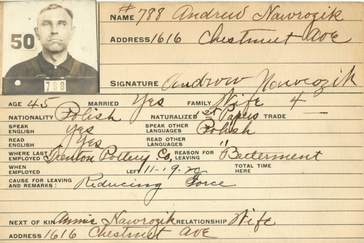
The Trent House Museum continues to expand its interpretation of Trenton's history. In this program, available via Zoom, records of Roebling Factory employees in the years immediately after World War I are used to explore the question, "Why were some workers who immigrated to the United States from Europe considered 'American' while others were not?"
Four boxes of employee records found in the Trentoniana Collection of the Trenton Public Library are a treasure trove of detailed information about nearly 900 men who worked in Rope Shop No. 2, Department 50, of the Roebling Wire Factory in Trenton in the early part of the 20th century. Samuel Stephens, trustee of the Trent House Association, and Matthew Xu, student intern from West Windsor - Plainsboro High School South, present the results of their examination of these records. They focus on factors that affected why some workers' employment records showed with a dual nationality combining their country of origin with "American," and others did not. They explore factors in the individual workers' lives as well as in the social and political dynamics of the time and ask us to consider what the experiences of these immigrants might tell us about immigration to the United States today.
Four boxes of employee records found in the Trentoniana Collection of the Trenton Public Library are a treasure trove of detailed information about nearly 900 men who worked in Rope Shop No. 2, Department 50, of the Roebling Wire Factory in Trenton in the early part of the 20th century. Samuel Stephens, trustee of the Trent House Association, and Matthew Xu, student intern from West Windsor - Plainsboro High School South, present the results of their examination of these records. They focus on factors that affected why some workers' employment records showed with a dual nationality combining their country of origin with "American," and others did not. They explore factors in the individual workers' lives as well as in the social and political dynamics of the time and ask us to consider what the experiences of these immigrants might tell us about immigration to the United States today.
Celebrating Hogmanay with Scottish Music
Saturday, December 26, 2020 - 1 pm
Saturday, December 26, 2020 - 1 pm
|
The Trent House Association presented The Practitioners of Musick in a performance honoring the Scottish heritage of William Trent , including music that George Washington and his family enjoyed. He was said to be especially fond of William Shield’s comic opera Rosina, which was performed in Philadelphia, the nation’s capital, during his Presidency. Some of the opera’s melodies drew on Scottish folk songs. John Burkhalter and Donovan Klotzbeacher founded the Practitioners of Musick to the research and performance of the musical riches of 18th century Great Britain and the Colonial and Federal periods in America. They have performed and lectured at libraries, museums, and historic sites throughout the region and beyond.
Following the concert, Marisa Benson read her original poem "Step into the New Year," written especially for the 2020 Hogmanay program. Click here to download and play her reading. |
Mary Coddington Trent Reflects - 1726
Video Premiere
Sunday, December 20, 2020 - 2 pm
Video Premiere
Sunday, December 20, 2020 - 2 pm
|
The video can be viewed by clicking here.
|
Re-enacted by the American Historical Theater, the Trent House's newest video project portrays what we know about the life of William Trent's second wife and her experiences after his sudden death on Christmas Day 1724. Dressed in a new gown in the latest fashion, Mary Trent recounts her early life and events from her marriage to Mr. Trent. Set in 1726, she is awaiting the outcome of her lawsuit against her eldest step-son James that will determine her financial standing and security.
|
|
The Art of the Historical Poster: The Washington-Rochambeau Route through Mercer County to Victory at Yorktown, 1781 - An Illustrated Virtual Talk
David Bosted November 14, 2020 The Trent House played a significant part in the movement of the French and Continental Armies to trap General Cornwallis and his British-Hessian army at Yorktown, Virginia in 1781. What is the best way to tell this epic story about how the French & American Armies accomplished a 580-mile march to Yorktown, with Mercer County being the critical halfway point? Spoiler Alert: Historical Poster(s)! Urbanologist David Bosted, a Trustee at the Trenton City Museum, explained how the long march was accomplished, the role of Trenton and the Trent House, and why historical posters are the best way to tell the story. |
Digging Up Trenton's History Before Stacy and Trent - An Illustrated Virtual Talk
Richard Adamczyk
October 10, 2020
Richard Adamcyzk, archaeologist with historic preservation firm of Richard Grubb & Associates and Second Vice President of the Archaeological Society of New Jersey, reviewed the field of prehistoic archaeology in New Jersey, showed Native American artifacts found recently on the Trent House property, and explained how the property fits into the greater complex of ancient Trenton sites.
Richard Adamczyk
October 10, 2020
Richard Adamcyzk, archaeologist with historic preservation firm of Richard Grubb & Associates and Second Vice President of the Archaeological Society of New Jersey, reviewed the field of prehistoic archaeology in New Jersey, showed Native American artifacts found recently on the Trent House property, and explained how the property fits into the greater complex of ancient Trenton sites.
Public Archaeology Day
Hunter Research
July 9, 2020
Staff from Hunter Research, a Trenton-based cultural resources service firm, collected soil samples across the Museum grounds. The samples will be analyzed to learn more about where on the property are especially important sites for future excavation. Visitors were given an orientation to prior excavations with examples of artifacts and observed the sampling process and initial on-site analysis.
Hunter Research
July 9, 2020
Staff from Hunter Research, a Trenton-based cultural resources service firm, collected soil samples across the Museum grounds. The samples will be analyzed to learn more about where on the property are especially important sites for future excavation. Visitors were given an orientation to prior excavations with examples of artifacts and observed the sampling process and initial on-site analysis.
|
Remember the Ladies – The Critical Role of African American Men and Women in Women’s Suffrage
Lecture by author Angela Dodson March 14, 2020 Opening our exhibit of Rightfully Hers on the 100th anniversary of women’s right to vote in the United States, local author Angela Dodson spoke about the role of African American men and women in the movement for universal suffrage. Copies of her book, Remember the Ladies: Celebrating Those Who Fought for Freedom at the Ballot Box, were available for sale and signing. |
|
African American History In Quilts
A talk by members of the Princeton Sankofa Stitchers Modern Quilt Guild In conjunction with If These Quilts Could Talk on display at the Trenton City Museum at Ellarslie February 29, 2020 Mada Coles Galloway, Juandamarie Gikandi, and Gail Mitchell, members of the Princeton Sankofa Stitchers Modern Quilt Guild, spoke about the art and craft of quilting, the history of the Guild and their personal background in quilting, and inspiration for their work in the African American experience. |
|
Needham Roberts – Trenton’s Own War Hero
Lecture by Algernon Ward January 19, 2020 Born and raised in Trenton, Needham Roberts was 17 when he enlisted in the Harlem Hellfighters. He and his fellow Hellfighter William Johnson were awarded the Croix de Guerre and the Purple Heart for their actions fighting off a German patrol in France in 1918. Regardless of these achievements, they and their fellow African American soldiers returned to the United States to face discrimination and prejudice. Trenton resident Algernon Ward, well known for his many roles as African American soldiers from the Revolutionary War through the World Wars, presented a fascinating portrait of Roberts in the context of race relations in America during the Jim Crow era. His illustrated talk was accompanied by a display of Army uniforms and military equipment of the time. |
|
Hogmanay
December 28, 2019 More than 100 guests enjoyed a varied program honoring William Trent’s Scottish heritage in Hogmanay, the traditional celebration in Scotland of the New Year. The program included bagpipers from the Greater Trenton Pipes and Drums, 18th century Scottish songs performed by Liberty Tree (Stacy Roth and Bob Dupre), and Trenton Councilwoman Marge Caldwell-Wilson reminisced about Hogmanay in her childhood home of Scotland. |
|
Caledonia – A Scots Musical Entertainment
December 7, 2019 The Trent House Association presented The Practitioners of Musick – John Burkhalter III and Donovan Klotzbeacher - in a performance honoring the Scottish heritage of William Trent and celebrating the 300th anniversary of the house he built at the Falls of the Delaware in 1719. The program, “Caledonia,” included music for recorder and harpsichord composed by Bremner, Oswald, and Ramsey, among other Scottish masters, and was performed in the historic house. |
|
Preserving Trenton’s African American History – The Higbee School
Presented by Lisa Michelle Toro November 8, 2019 Trenton, like other northern communities, did not allow African American children to attend school with their white counterparts and instead built separate schools. The Higbee Street School was built in 1857 as a school for African American children in the city and was soon joined in the neighborhood by other segregated schools. The Trent House Association has joined with other groups and individuals in Trenton seeking to recognize the history of racial injustice and the struggle for equal rights that continues today by restoring the Higbee Street School. Once restored, the School can serve our community as a center for learning and commemoration. |
|
History and Preservation of The William Trent House
Lecture by Kevin Joy October 19, 2019 The 1719 home of Trenton’s namesake, William Trent, was the topic of this program in association with The Princeton Preservation Group. The William Trent House, now a museum, is significant historically and architecturally. In the course of its 300-year existence, it has seen many structural changes, in spite of which it remains remarkably intact. In this lecture, Kevin Joy – Trent House Association trustee and historic preservation specialist - presented a brief history of the house, an overview of its architecture, and examined in detail structural changes over the years. He also discussed recent rehabilitations and the conservation and preservation challenges faced in maintaining an antique house museum. |
|
History Never Tasted So Good - Colonial Style Dinner October 12, 2019 A colonial style dinner was held at Trinity Cathedral for friends and supporters of the Trent House Association in celebration of the 300th anniversary year of the construction of the William Trent House. See here for our 300th Anniversary program book. |
|
The World of Captain William Trent
Lecture by Jason Cherry July 21, 2019 Author Jason Cherry shared the results of his extensive research into the life of William Trent’s youngest son as he lead a band of men to defend the English control of the Forks of the Ohio River- the frontier in the struggle between the French and the English for the heart of the continent. Colonial Encampment and Old Fashioned Ice Cream Social July 20, 2019 The Trent House Museum’s annual Ice Cream Social for 2019 was enhanced by the presence of Pittsburgh-based Captain William Trent’s Company of re-enactors of the French and Indian War militia led by Trent’s youngest son William. |
|
Celebrating 300 Years of the William Trent House
Hosted by the Philadelphia Chapter of the Institute for Classical Architecture and Art and The Trent House Association June 1, 2019 Participants enjoyed fine food and drink on the grounds of the Trent House Museum as well as guided tours of the House and its recent restoration. The event was held in honor of the Museum’s 2019 Grand Jury Award for historic preservation from the Preservation Alliance of Greater Philadelphia. See here for our 300th Anniversary program book. |
|
Mahlon Stacy : Colonial Pioneer at the Falls of The Delaware
Lecture by Shawn Carney May 18, 2019 This illustrated lecture explored what is known about Mahlon Stacy, the first European settlers in what is now Trenton. Shawn Carney, Trent House docent and researcher, discussed the situation in England that led Quakers like Stacy to immigrate to the American colonies and the experiences of the Stacy family on their plantation at the Falls of the Delaware, much of which was later purchased by William Trent. For more information about this painting and how you can help the Trent House preserve it, click here! |
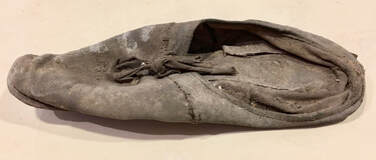
The Mystery of the Shoe in the Roof: Panel Discussion
April 7, 2019
Experts on concealed objects, Early American shoes, and the architecture of the Trent House gathered to explore why, when, and how a shoe was hidden in the House roof. Chris Manning explained the tradition of concealing objects such as old shoes in the roof or walls of buildings as a way to ward off evil spirits – a tradition that began in the Middle Ages in Europe and found its way to America through its immigrants. Valentine Povinelli, master shoemaker at Colonial Williamsburg, described his analysis of the shoe and his conclusion that it was likely a woman’s shoe from 1830-1850. Kevin Joy, Trent House Association trustee and historic preservation expert, documented changes to the Trent House roof over its 300-year history, specifically noting changes during the early-mid 1800s that provided the opportunity for workers to place the shoe there.
April 7, 2019
Experts on concealed objects, Early American shoes, and the architecture of the Trent House gathered to explore why, when, and how a shoe was hidden in the House roof. Chris Manning explained the tradition of concealing objects such as old shoes in the roof or walls of buildings as a way to ward off evil spirits – a tradition that began in the Middle Ages in Europe and found its way to America through its immigrants. Valentine Povinelli, master shoemaker at Colonial Williamsburg, described his analysis of the shoe and his conclusion that it was likely a woman’s shoe from 1830-1850. Kevin Joy, Trent House Association trustee and historic preservation expert, documented changes to the Trent House roof over its 300-year history, specifically noting changes during the early-mid 1800s that provided the opportunity for workers to place the shoe there.
|
If These Stones Could Talk: Reading and Presentation
Beverly Mills and Elaine Buck March 30, 2019 Cemeteries have stories to tell, voices to unearth–and lessons from the past that we can draw upon to better shape the future. If These Stones Could Talk documents, through dozens of oral histories, collected lives of a minority Black community in a predominantly White region and brings fresh light to a forgotten corner of American history in a small cemetery in central New Jersey. In their book talk, Elaine Buck and Beverly Mills shared excerpts and images from the book. |
|
Bishop Richard Allen’s Hymnal: Lecture & Concert
February 17, 2019 Jason Allen, former director of the museum at Mother Bethel AME Church, presented an illustrated lecture on AME church founder, Bishop Richard Allen, including his lifelong efforts as abolitionist and patriot that place him among our nation’s founding fathers. Philadelphia’s Craft Works Music group performed music from Bishop Allen’s hymnal, which used shape notes to encourage congregational singing. |
|
The Unfortunate History of Slavery and the Quakers in New Jersey
Lecture by Richard Geffken February 9, 2019 Richard Geffken, an archival historian with the Shrewsbury Historical Society and the Monmouth County Historical Association, presented an overview of the history and legacy of New Jersey’s two-hundred-year embrace of human bondage. |


















